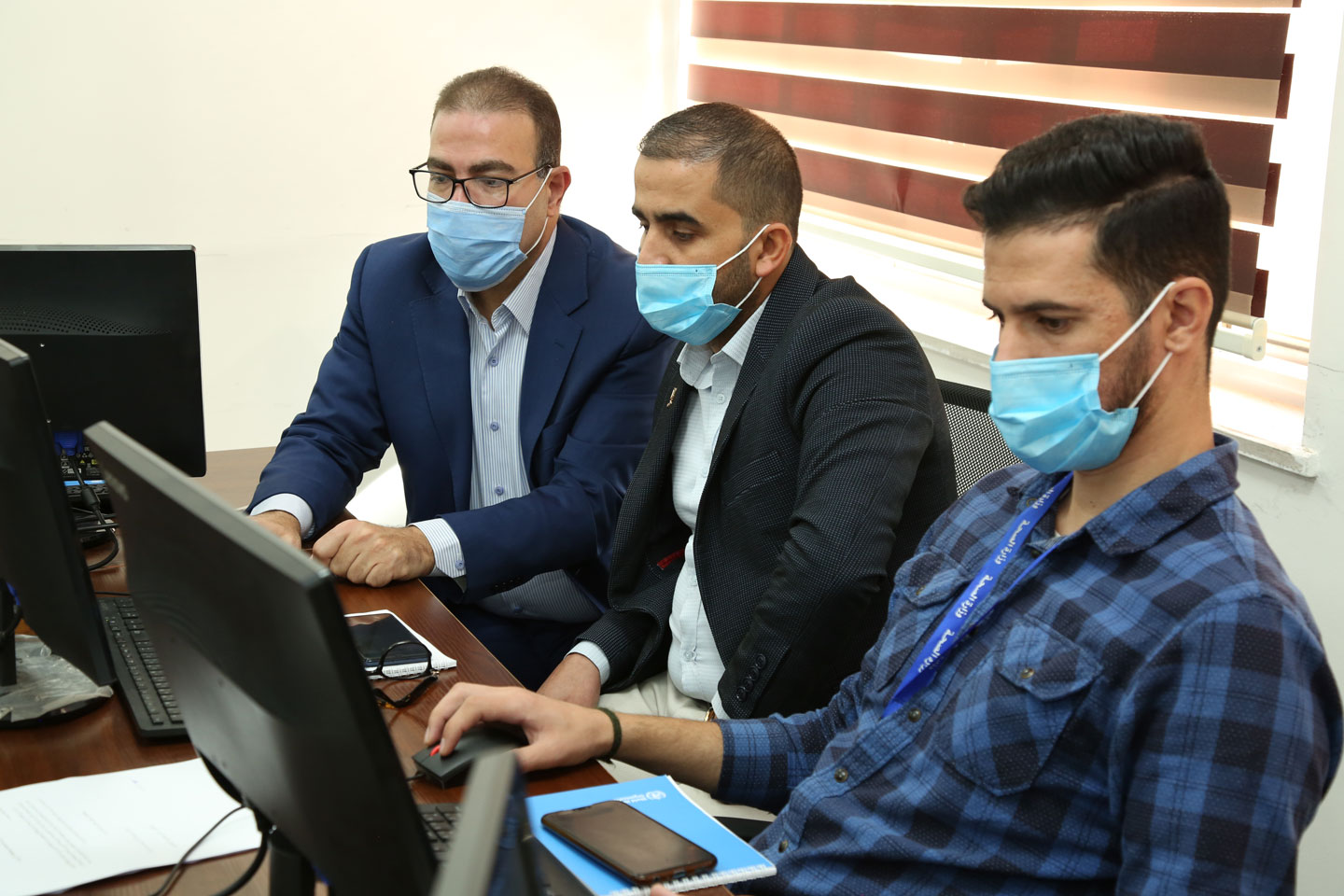WHO leads EIOS training to strengthen disease surveillance in Saudi Arabia
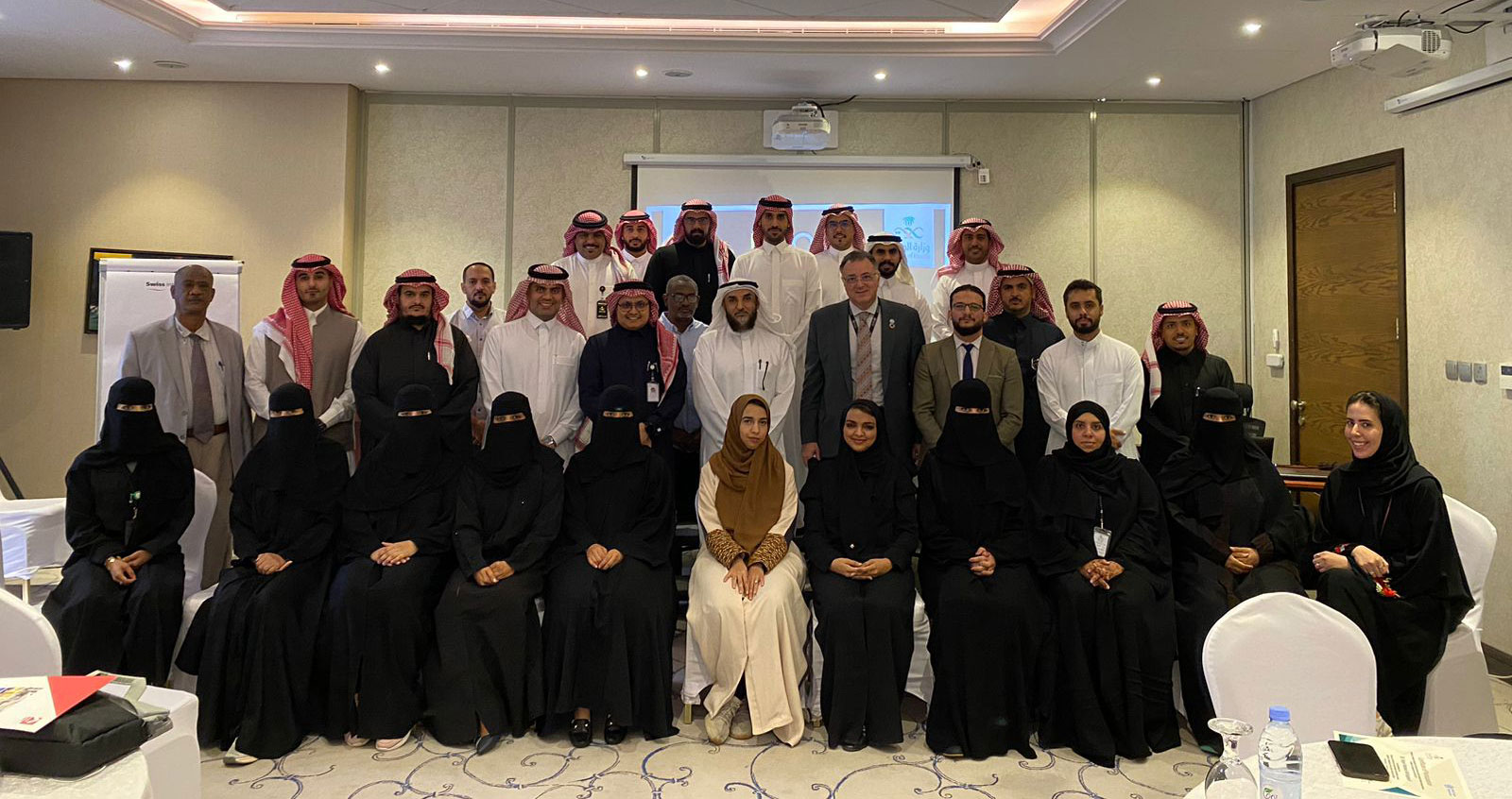
 A group photo of the training participants. Photo credit: A. Zuhair
18 April 2024, Cairo, Egypt – Refresher training on the Epidemic Intelligence from Open Sources (EIOS) system has been run by WHO in Riyadh, Saudi Arabia. The training aims to strengthen the existing event-based surveillance (EBS) system within the national surveillance framework by implementing this innovative detection tool.
The 3-day training was attended by EBS staff from various regions of Saudi Arabia, public health emergency operations centre personnel, and other stakeholders involved in EBS within the Ministry of Health of Saudi
...
A group photo of the training participants. Photo credit: A. Zuhair
18 April 2024, Cairo, Egypt – Refresher training on the Epidemic Intelligence from Open Sources (EIOS) system has been run by WHO in Riyadh, Saudi Arabia. The training aims to strengthen the existing event-based surveillance (EBS) system within the national surveillance framework by implementing this innovative detection tool.
The 3-day training was attended by EBS staff from various regions of Saudi Arabia, public health emergency operations centre personnel, and other stakeholders involved in EBS within the Ministry of Health of Saudi
...
Annual meeting for country focal points of pandemic influenza preparedness in the EMR - July 2023

...
WHO builds surveillance and laboratory capacity on high-threat pathogens and genomic sequencing in Yemen

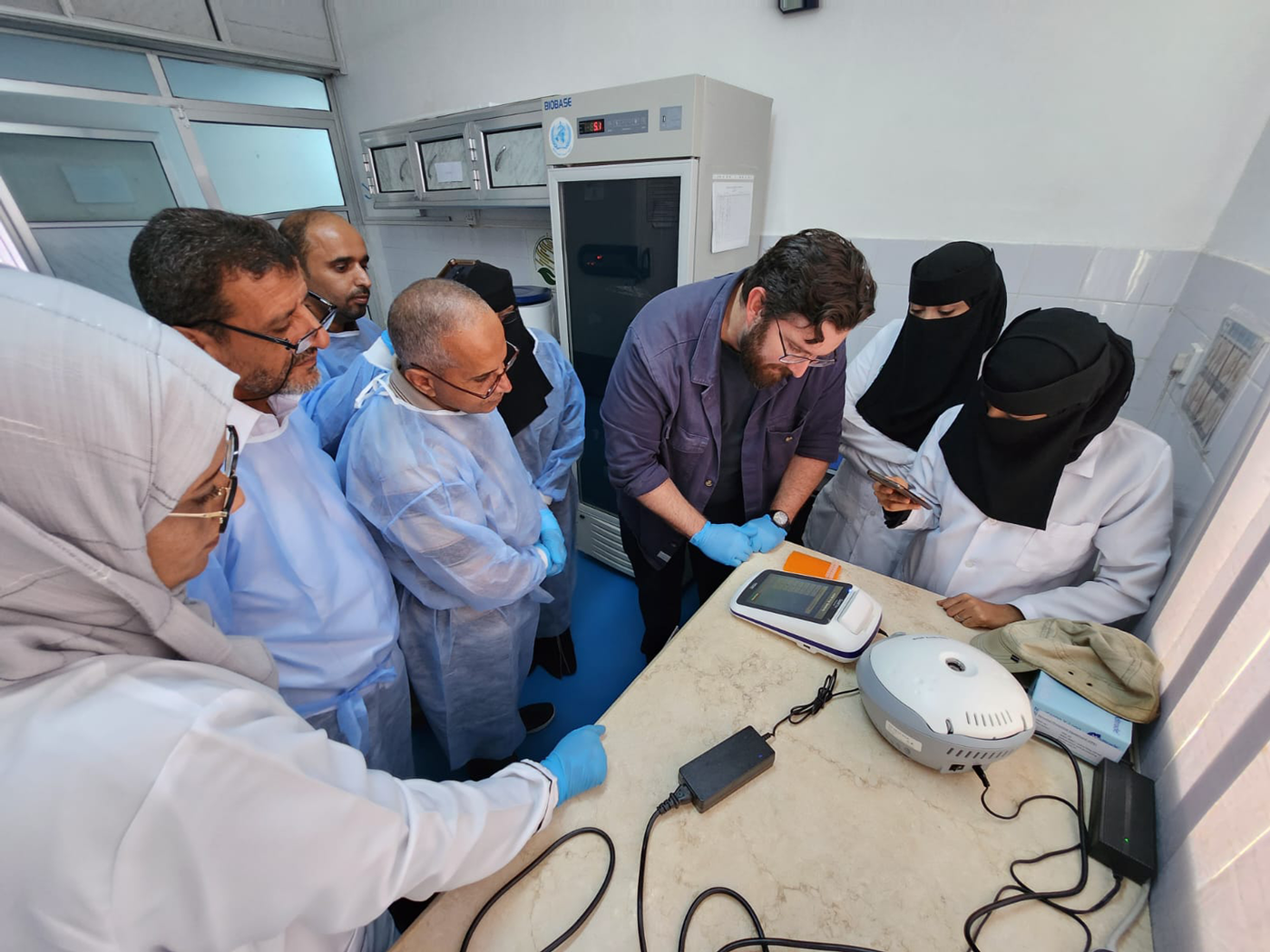 WHO expert during the training session, Aden
Cairo, 5 June 2023 – WHO conducted a technical mission to Aden, Yemen, on 24 May–1 June, to assess and enhance country capacity for the detection and surveillance of high-threat pathogens, such as arboviral and acute watery diarrhoeal disease.
Members of the mission held a meeting in the WHO Aden sub-office with representatives from the Ministry of Public Health and Population, national and subnational surveillance teams, Central Public Health Laboratory and WHO laboratory experts.
WHO experts discussed existing surveillance mechanisms for high-threat pathogens, identified
...
WHO expert during the training session, Aden
Cairo, 5 June 2023 – WHO conducted a technical mission to Aden, Yemen, on 24 May–1 June, to assess and enhance country capacity for the detection and surveillance of high-threat pathogens, such as arboviral and acute watery diarrhoeal disease.
Members of the mission held a meeting in the WHO Aden sub-office with representatives from the Ministry of Public Health and Population, national and subnational surveillance teams, Central Public Health Laboratory and WHO laboratory experts.
WHO experts discussed existing surveillance mechanisms for high-threat pathogens, identified
...
إطلاق شبكة شرق المتوسط للإنفلونزا-2: قصة نجاح من السعودية

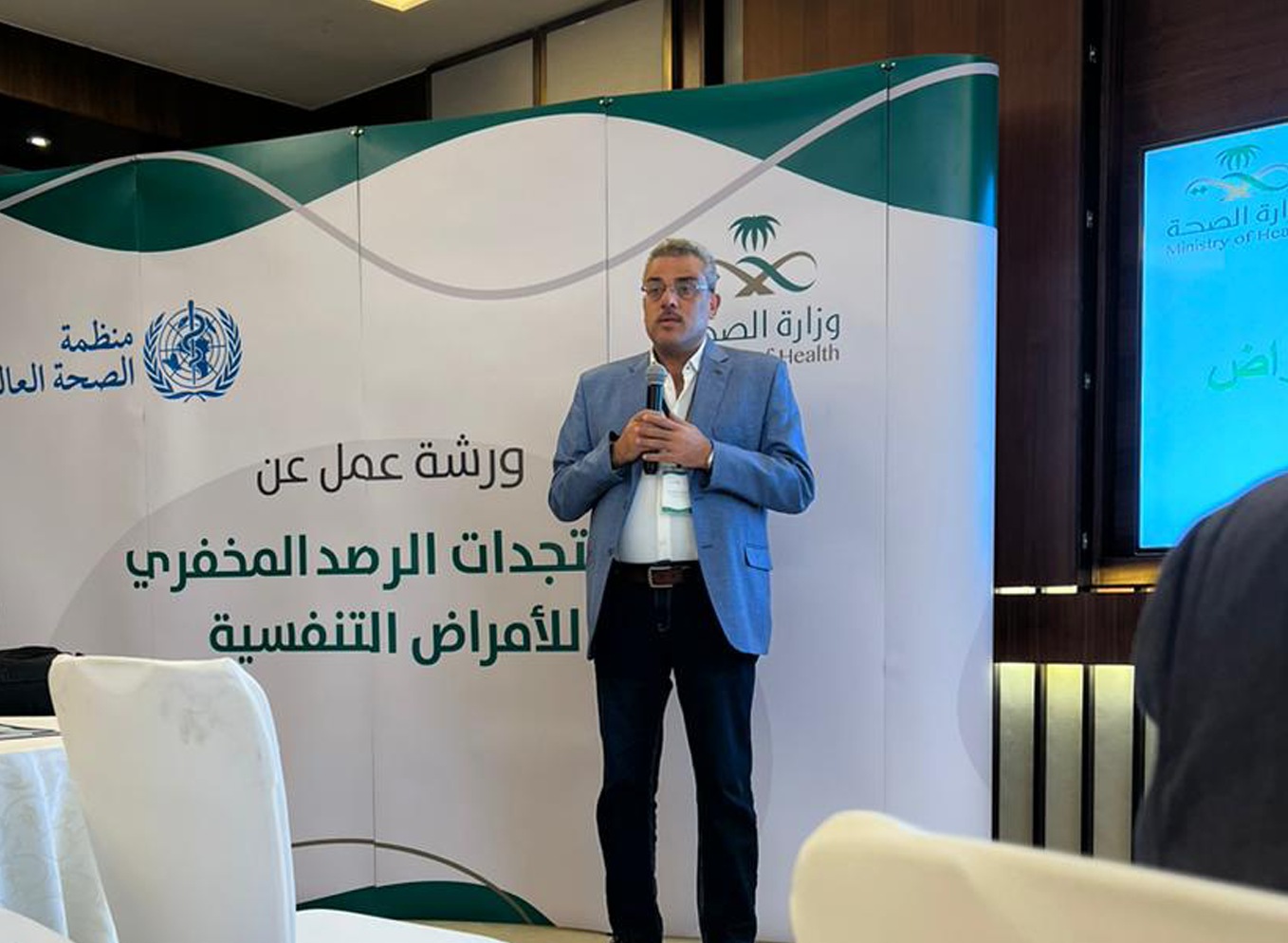 أحد موظفي منظمة الصحة العالمية خلال الدورة التدريبية لشبكة شرق المتوسط للإنفلونزا-2، كانون الأول/ ديسمبر 2022
القاهرة، 8 أيار/مايو 2023 - يمكن أن يتيح جمع البيانات الوبائية بانتظام وفي الوقت المناسب، على المستويين الفردي والجماعي، للبلدان تقييم التغيرات المرتبطة بظهور مختلف مسببات الأمراض التنفسية التي يمكن أن تتحول إلى أوبئة وجوائح. ويمكن ترجمة هذه البيانات إلى معلومات مُسندة بالبيّنات لراسمي السياسات يمكن استخدامها لتعزيز تدابير الوقاية على المستويات الوطنية والإقليمية والعالمية.
وتُعدُّ شبكة شرق المتوسط للإنفلونزا منصة إلكترونية موحدة لجمع البيانات من أجل تبادل البيانات الوبائية والفيروسية عن الإنفلونزا في
...
أحد موظفي منظمة الصحة العالمية خلال الدورة التدريبية لشبكة شرق المتوسط للإنفلونزا-2، كانون الأول/ ديسمبر 2022
القاهرة، 8 أيار/مايو 2023 - يمكن أن يتيح جمع البيانات الوبائية بانتظام وفي الوقت المناسب، على المستويين الفردي والجماعي، للبلدان تقييم التغيرات المرتبطة بظهور مختلف مسببات الأمراض التنفسية التي يمكن أن تتحول إلى أوبئة وجوائح. ويمكن ترجمة هذه البيانات إلى معلومات مُسندة بالبيّنات لراسمي السياسات يمكن استخدامها لتعزيز تدابير الوقاية على المستويات الوطنية والإقليمية والعالمية.
وتُعدُّ شبكة شرق المتوسط للإنفلونزا منصة إلكترونية موحدة لجمع البيانات من أجل تبادل البيانات الوبائية والفيروسية عن الإنفلونزا في
...
WHO provides support in north-west Syria in the aftermath of the earthquake

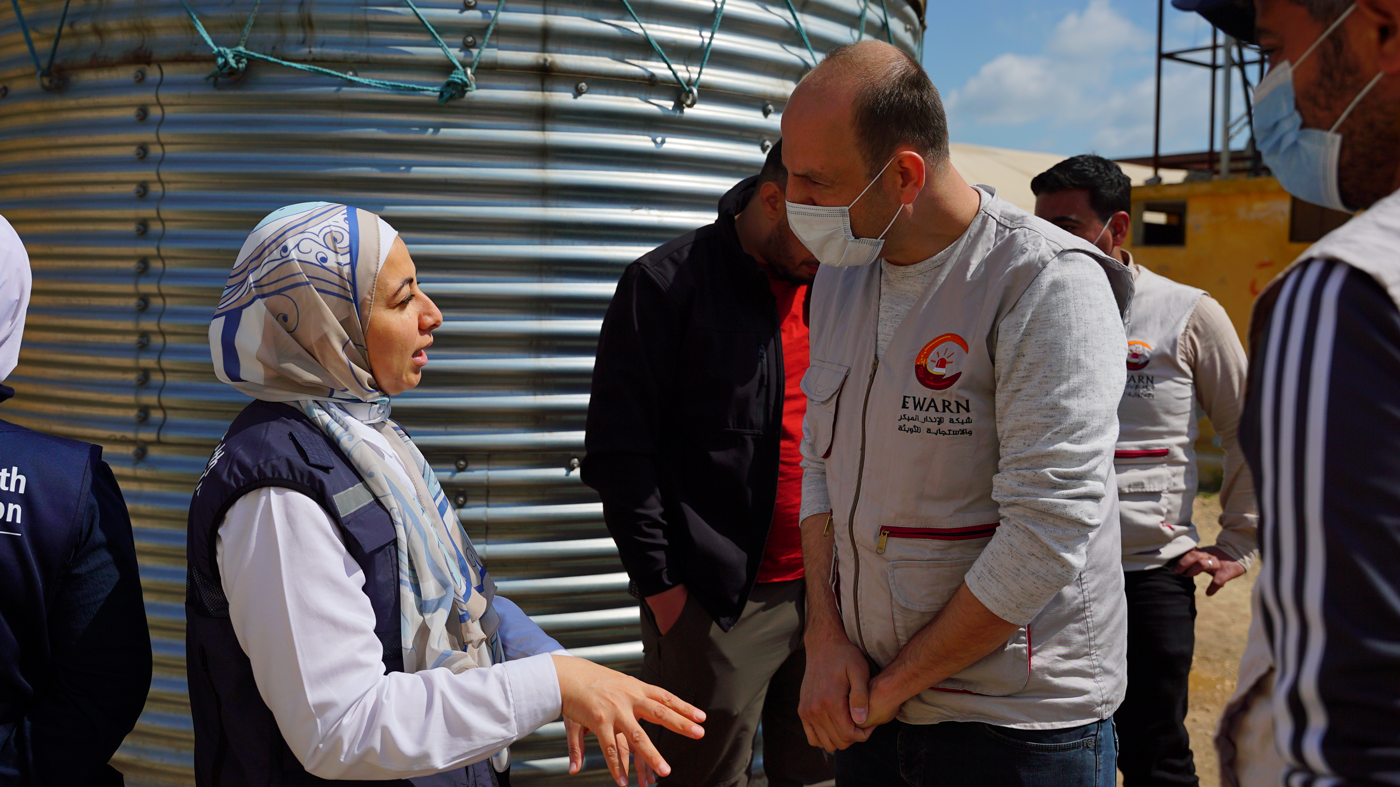 WHO staff member and EWARN counterpart assessing the functionality of the network in Maaret Tamsrin district.
Cairo, 20 April 2023 – The WHO Regional Office for the Eastern Mediterranean has undertaken a surge mission to support the emergency response in north-west Syria in the aftermath of the devastating earthquakes and close to 1300 aftershocks that struck south-east Türkiye and north-west Syria in February 2023.
During the 1-month mission, various activities were conducted, including supporting the Gaziantep field office to respond to the increased risk of communicable disease outbreaks and epidemics following
...
WHO staff member and EWARN counterpart assessing the functionality of the network in Maaret Tamsrin district.
Cairo, 20 April 2023 – The WHO Regional Office for the Eastern Mediterranean has undertaken a surge mission to support the emergency response in north-west Syria in the aftermath of the devastating earthquakes and close to 1300 aftershocks that struck south-east Türkiye and north-west Syria in February 2023.
During the 1-month mission, various activities were conducted, including supporting the Gaziantep field office to respond to the increased risk of communicable disease outbreaks and epidemics following
...
WHO conducts pilot testing of new rapid response team training programme in Nepal, Saudi Arabia and Uganda

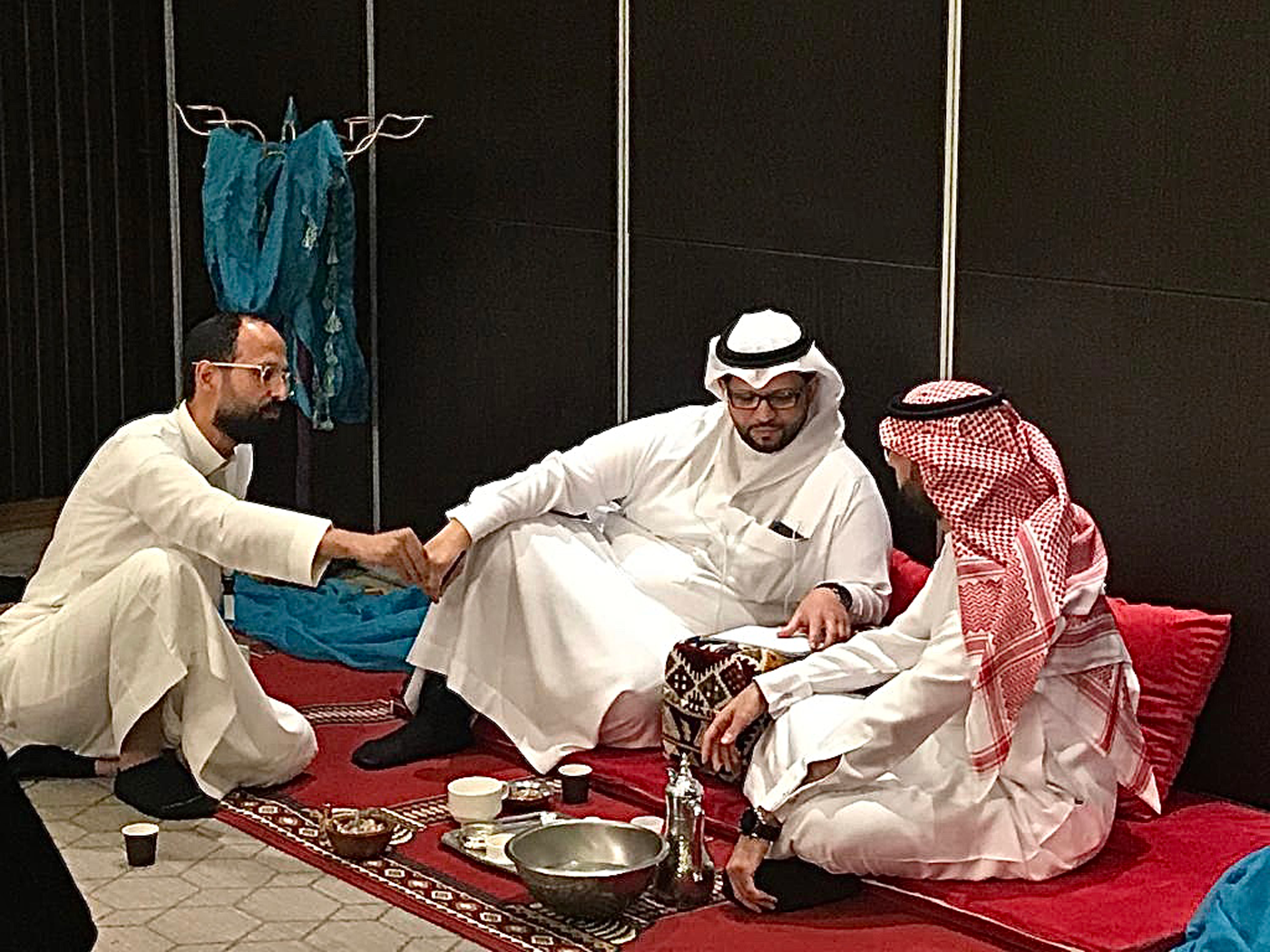 Rapid response team members take part of a scenario-based skills drill roleplay in an advanced training session, Saudi Arabia. Credit: WHO
Cairo, 16 March 2023 – WHO’s monthly report providing information on health emergencies operational updates highlighted the pilot testing of the new rapid response team training programme in Nepal, Saudi Arabia and Uganda.
Rapid response teams are trained and equipped multidisciplinary teams, able to deploy rapidly at national and subnational level to efficiently respond to any public health emergency.
Rapid response teams are not the only actors involved in a
...
Rapid response team members take part of a scenario-based skills drill roleplay in an advanced training session, Saudi Arabia. Credit: WHO
Cairo, 16 March 2023 – WHO’s monthly report providing information on health emergencies operational updates highlighted the pilot testing of the new rapid response team training programme in Nepal, Saudi Arabia and Uganda.
Rapid response teams are trained and equipped multidisciplinary teams, able to deploy rapidly at national and subnational level to efficiently respond to any public health emergency.
Rapid response teams are not the only actors involved in a
...
Training workshop aims to enhance timely reporting of sentinel influenza data in Jordan

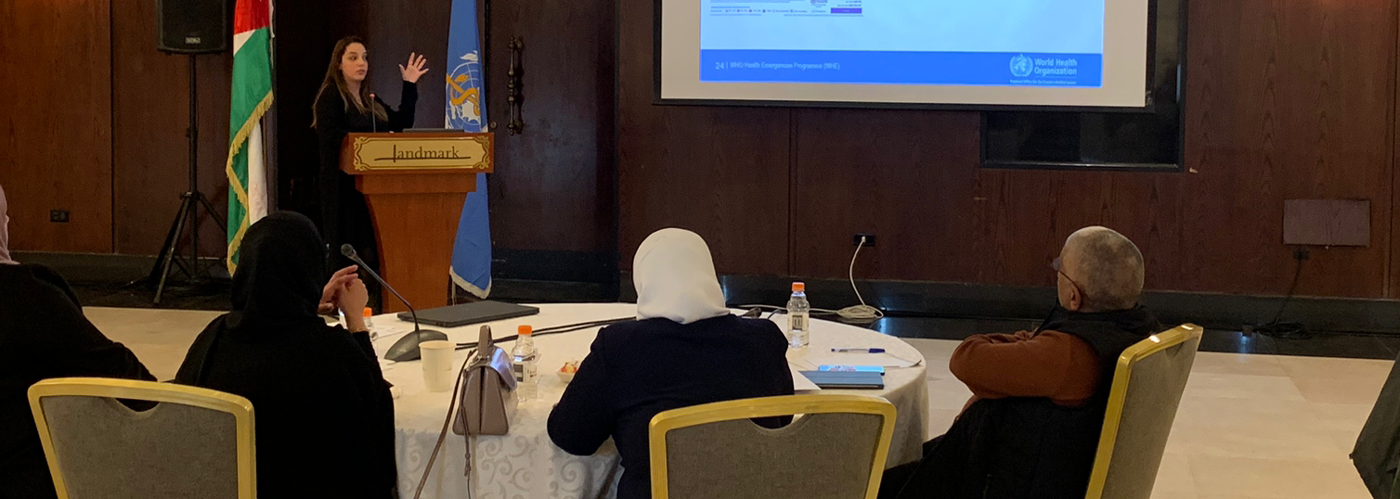 WHO expert explaining the different WHO platforms for reporting data on influenza and other respiratory viruses (Photo: WHO/A. Aman)
Jordan, 17 January 2023 – Experts from the Infectious Hazard Prevention and Preparedness (IHP) programme at the WHO Regional Office for the Eastern Mediterranean conducted a mission to Jordan in December 2022 to participate in national training for sentinel site teams and staff of the National Influenza Centre. Participants from sentinel sites, the National Influenza Centre and the Ministry of Health were also trained on using EMFLU-2 to support the transition
...
WHO expert explaining the different WHO platforms for reporting data on influenza and other respiratory viruses (Photo: WHO/A. Aman)
Jordan, 17 January 2023 – Experts from the Infectious Hazard Prevention and Preparedness (IHP) programme at the WHO Regional Office for the Eastern Mediterranean conducted a mission to Jordan in December 2022 to participate in national training for sentinel site teams and staff of the National Influenza Centre. Participants from sentinel sites, the National Influenza Centre and the Ministry of Health were also trained on using EMFLU-2 to support the transition
...
WHO meeting held on global progress towards implementation of the respiratory syncytial virus surveillance pilot project

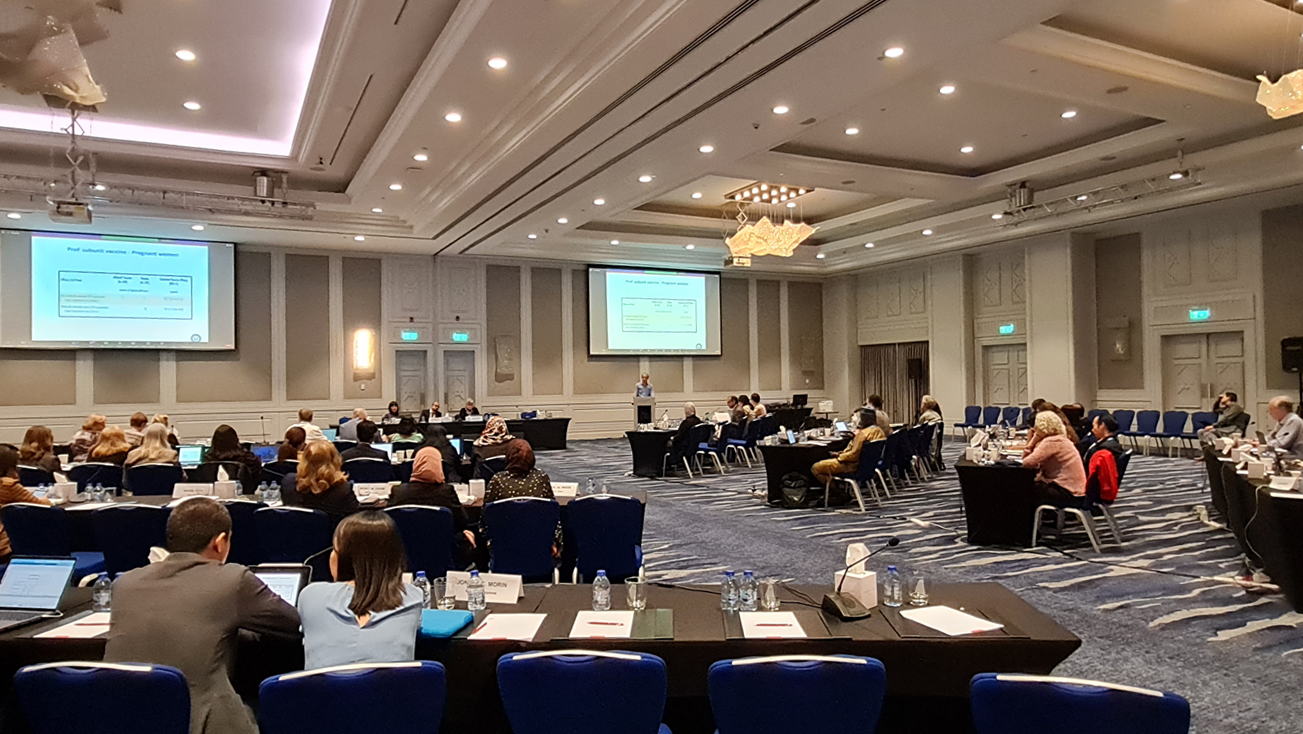 Participants at a plenary session
Cairo, 11 December 2022 – The WHO Global Influenza Programme organized a technical meeting in Jordan, together with the WHO Regional Office for the Eastern Mediterranean, to review progress in phase 2 of the respiratory syncytial virus (RSV) surveillance strategy.
The meeting conducted from 29 November to 1 December brought together laboratory and RSV surveillance focal points from 25 pilot countries globally. The strategy is an extension to phase 1 and is piloted in these counties to standardize RSV surveillance and provide evidence to support
...
Participants at a plenary session
Cairo, 11 December 2022 – The WHO Global Influenza Programme organized a technical meeting in Jordan, together with the WHO Regional Office for the Eastern Mediterranean, to review progress in phase 2 of the respiratory syncytial virus (RSV) surveillance strategy.
The meeting conducted from 29 November to 1 December brought together laboratory and RSV surveillance focal points from 25 pilot countries globally. The strategy is an extension to phase 1 and is piloted in these counties to standardize RSV surveillance and provide evidence to support
...
تهدف بعثة منظمة الصحة العالمية إلى تيسير الترصُّد المتكامل لفيروس الإنفلونزا وغيره من فيروسات الجهاز التنفسي في المغرب

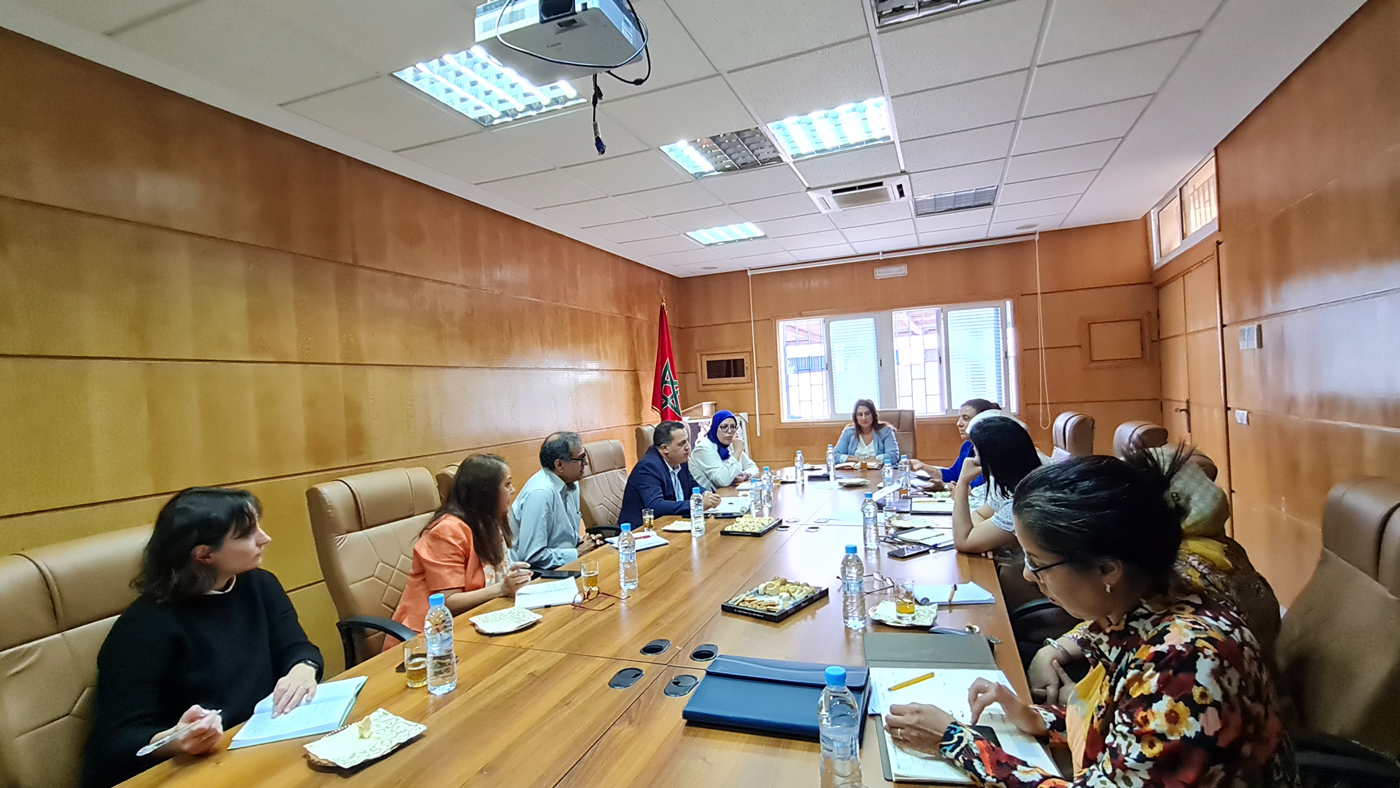 أعضاء البعثة يحضرون اجتماعًا مع إدارة الصحة الإقليمية بالرباط القاهرة، 5 كانون الأول/ديسمبر 2022 - أوفَدَ المكتب الإقليمي لمنظمة الصحة العالمية لشرق المتوسط بعثةً تقنية إلى المغرب لدعم البلد في تفعيل إطار الترصد المتكامل لفيروس الإنفلونزا وغيره من فيروسات الجهاز التنفسي الأخرى التي يمكن أن تسبب أوبئة وجوائح.
وقد أُوفدت هذه البعثة بالاشتراك مع موظفي المختبرات والأوبئة من المكتب القُطري لمنظمة الصحة العالمية في المغرب والمقر الرئيسي للمنظمة والمراكز الأمريكية لمكافحة الأمراض والوقاية منها.
والتقى أعضاء البعثة بكبار المسؤولين الحكوميين والموظفين التقنيين من وزارة الصحة والحماية الاجتماعية، بمن فيهم المدير العام لإدارة
...
أعضاء البعثة يحضرون اجتماعًا مع إدارة الصحة الإقليمية بالرباط القاهرة، 5 كانون الأول/ديسمبر 2022 - أوفَدَ المكتب الإقليمي لمنظمة الصحة العالمية لشرق المتوسط بعثةً تقنية إلى المغرب لدعم البلد في تفعيل إطار الترصد المتكامل لفيروس الإنفلونزا وغيره من فيروسات الجهاز التنفسي الأخرى التي يمكن أن تسبب أوبئة وجوائح.
وقد أُوفدت هذه البعثة بالاشتراك مع موظفي المختبرات والأوبئة من المكتب القُطري لمنظمة الصحة العالمية في المغرب والمقر الرئيسي للمنظمة والمراكز الأمريكية لمكافحة الأمراض والوقاية منها.
والتقى أعضاء البعثة بكبار المسؤولين الحكوميين والموظفين التقنيين من وزارة الصحة والحماية الاجتماعية، بمن فيهم المدير العام لإدارة
...
Training on influenza and SARS-CoV-2 genetic sequencing in Muscat, Oman

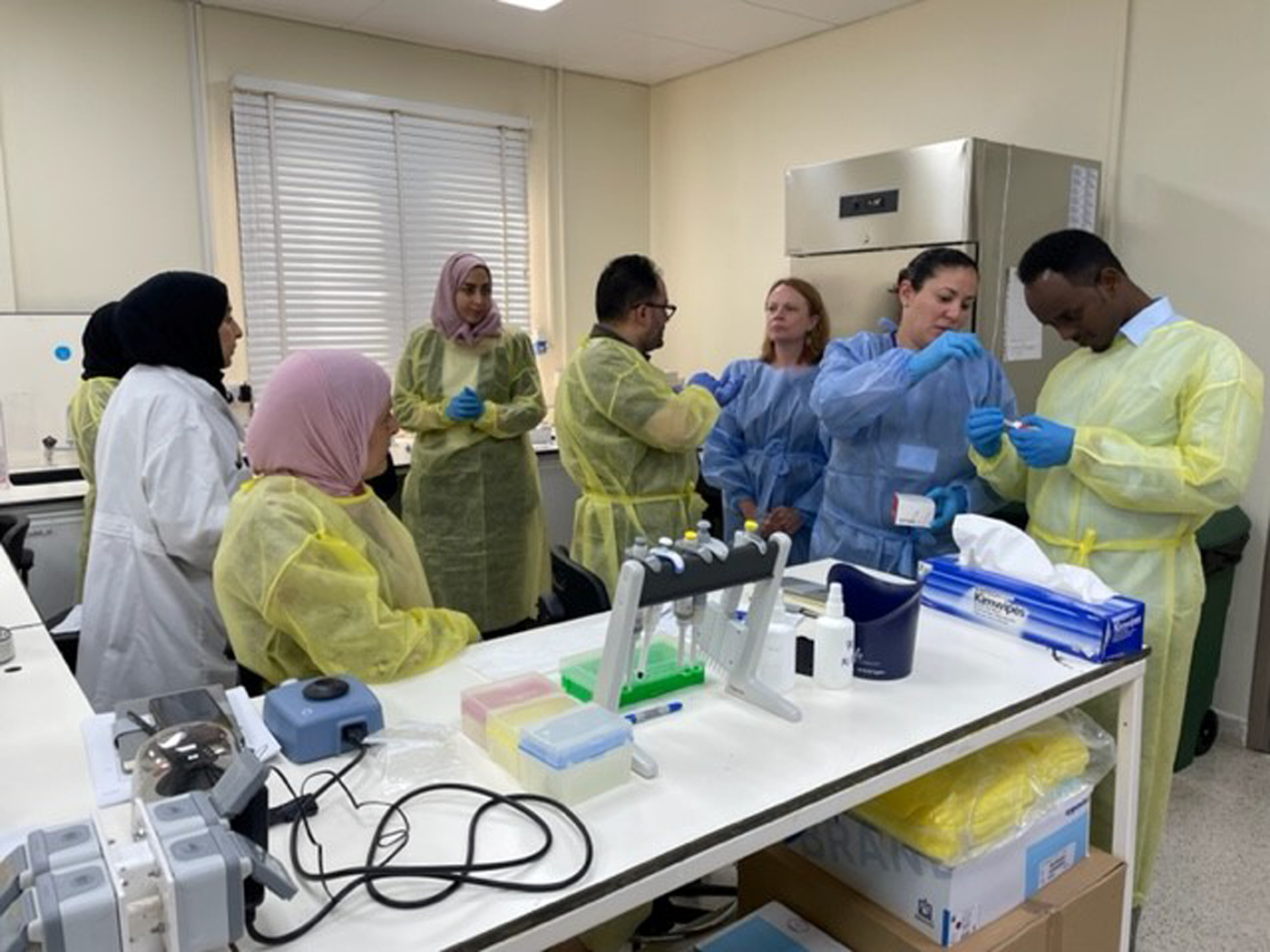 The training aimed to build capacity of national influenza centres across the Region Cairo, 4 December 2022 – The World Health Organization (WHO)’s Regional Office for the Eastern Mediterranean and the US Centers for Disease Control and Prevention (CDC) recently conducted back-to-back training in Muscat, Oman. The training was organized in partnership with Oman’s national influenza centre to build capacity across the Region to support end-to-end integration of severe acute respiratory virus coronavirus 2 (SARS-CoV-2), influenza sentinel surveillance and develop sequencing skills of national influenza centres.
The first training session on
...
The training aimed to build capacity of national influenza centres across the Region Cairo, 4 December 2022 – The World Health Organization (WHO)’s Regional Office for the Eastern Mediterranean and the US Centers for Disease Control and Prevention (CDC) recently conducted back-to-back training in Muscat, Oman. The training was organized in partnership with Oman’s national influenza centre to build capacity across the Region to support end-to-end integration of severe acute respiratory virus coronavirus 2 (SARS-CoV-2), influenza sentinel surveillance and develop sequencing skills of national influenza centres.
The first training session on
...
WHO reviews influenza sentinel surveillance system in Iraq

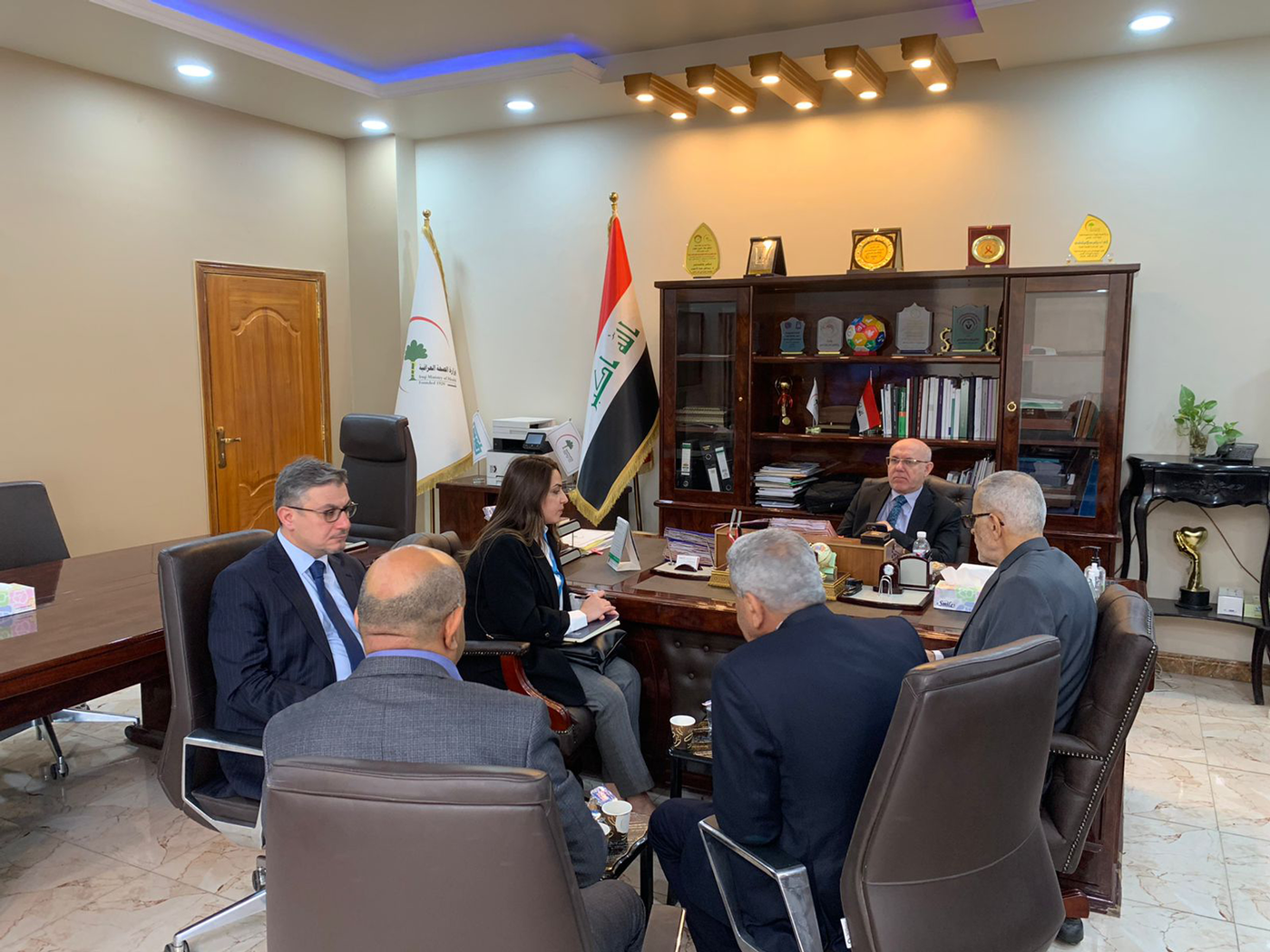 Participants discussions at the Iraqi Ministry of Health Iraq, 3 November 2022 – The Infectious Hazard Prevention (IHP) programme at the WHO Regional Office for the Eastern Mediterranean recently conducted a mission to Iraq to review the different processes of the influenza sentinel surveillance system, including looking at the effectiveness of its integrated surveillance and ensuring optimal use of resources.
Mission members identified best practices and challenges and provided recommendations to enhance the system following consultative meetings with national teams at the Department of Communicable Disease Control and the
...
Participants discussions at the Iraqi Ministry of Health Iraq, 3 November 2022 – The Infectious Hazard Prevention (IHP) programme at the WHO Regional Office for the Eastern Mediterranean recently conducted a mission to Iraq to review the different processes of the influenza sentinel surveillance system, including looking at the effectiveness of its integrated surveillance and ensuring optimal use of resources.
Mission members identified best practices and challenges and provided recommendations to enhance the system following consultative meetings with national teams at the Department of Communicable Disease Control and the
...
Reactivation of the influenza sentinel surveillance system in Sudan through PIP Framework mechanism support

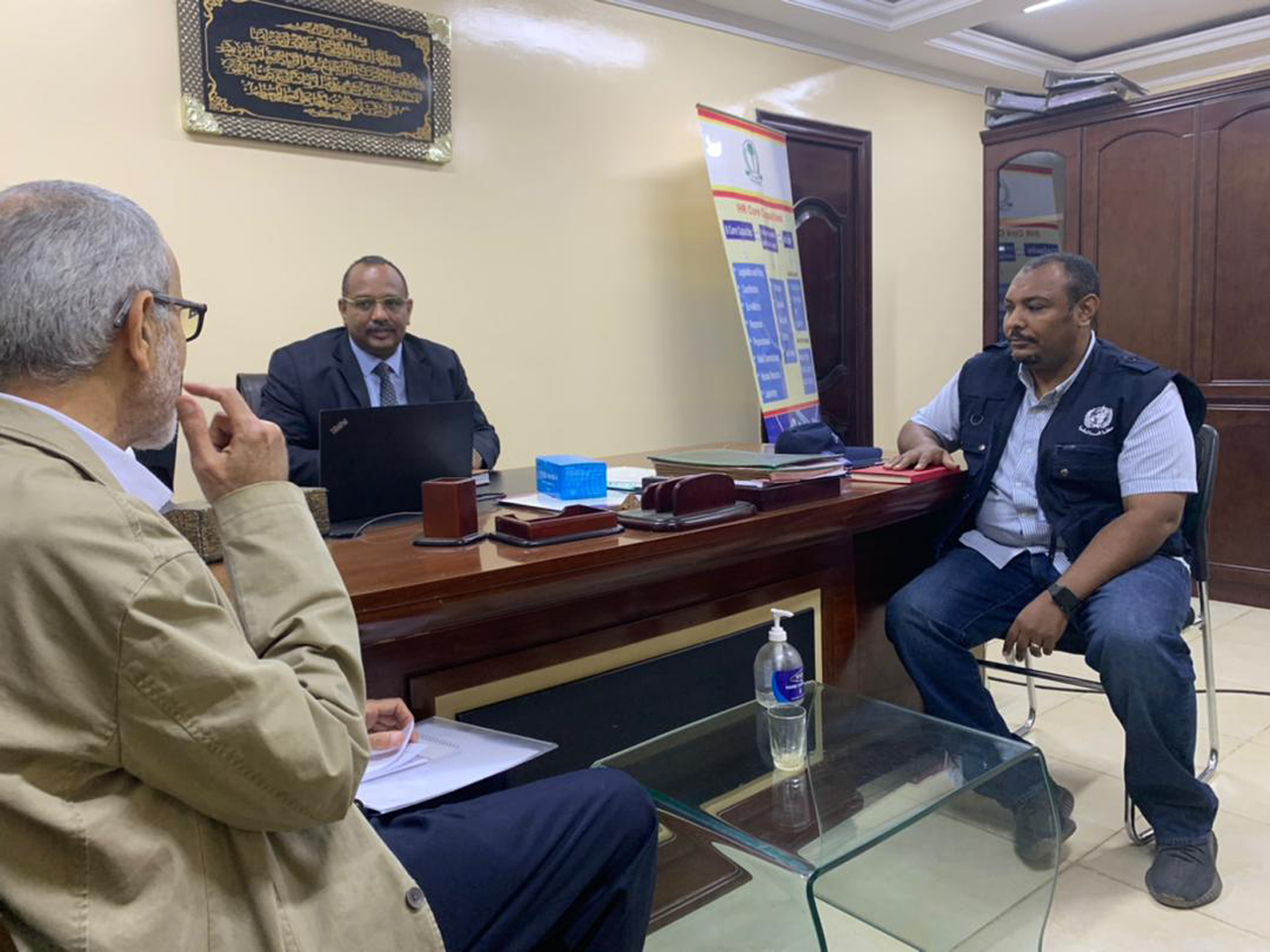 A consultative meeting with the Federal Ministry of Health, Sudan. Sudan, 19 September 2022 – The Infectious Hazard Prevention programme at the WHO Regional Office for the Eastern Mediterranean deployed an expert to Sudan to support influenza surveillance. The deployment aimed to support the Federal Ministry of Health to re-activate the dormant sentinel surveillance system and promote the integration of severe acute respiratory syndrome coronavirus-2 (SARS-CoV-2) and other respiratory viruses.
The expert’s support centred around operationalizing the otherwise stalled process of case enrolment through use of standard WHO case definitions, collection
...
A consultative meeting with the Federal Ministry of Health, Sudan. Sudan, 19 September 2022 – The Infectious Hazard Prevention programme at the WHO Regional Office for the Eastern Mediterranean deployed an expert to Sudan to support influenza surveillance. The deployment aimed to support the Federal Ministry of Health to re-activate the dormant sentinel surveillance system and promote the integration of severe acute respiratory syndrome coronavirus-2 (SARS-CoV-2) and other respiratory viruses.
The expert’s support centred around operationalizing the otherwise stalled process of case enrolment through use of standard WHO case definitions, collection
...
Jordan combating zoonotic diseases through joint risk assessment tool

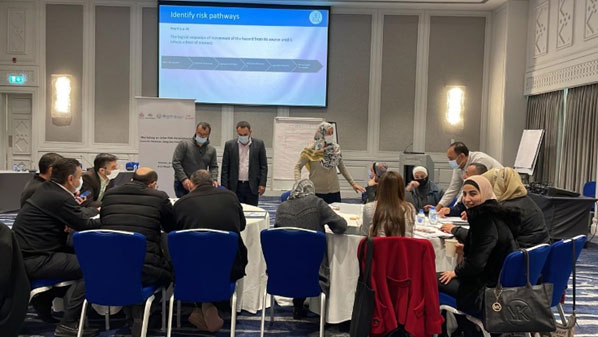 Amman, 12 April 2022 – Through the support of the Partnership Contribution mechanism under the Pandemic Influenza Preparedness Framework, a 4-day workshop to promote a joint risk assessment tool to combat zoonotic diseases took place in Jordan from 7 to 10 March 2022. The workshop organized by the WHO country office brought together 37 participants from the Ministry of Health, the Ministry of Agriculture and the Ministry of Environment with the goal of building national technical capacities to master the use of the tool and to agree on standard approaches and
...
Amman, 12 April 2022 – Through the support of the Partnership Contribution mechanism under the Pandemic Influenza Preparedness Framework, a 4-day workshop to promote a joint risk assessment tool to combat zoonotic diseases took place in Jordan from 7 to 10 March 2022. The workshop organized by the WHO country office brought together 37 participants from the Ministry of Health, the Ministry of Agriculture and the Ministry of Environment with the goal of building national technical capacities to master the use of the tool and to agree on standard approaches and
...
WHO extends support to Saudi Arabia in testing upgraded electronic influenza surveillance platform

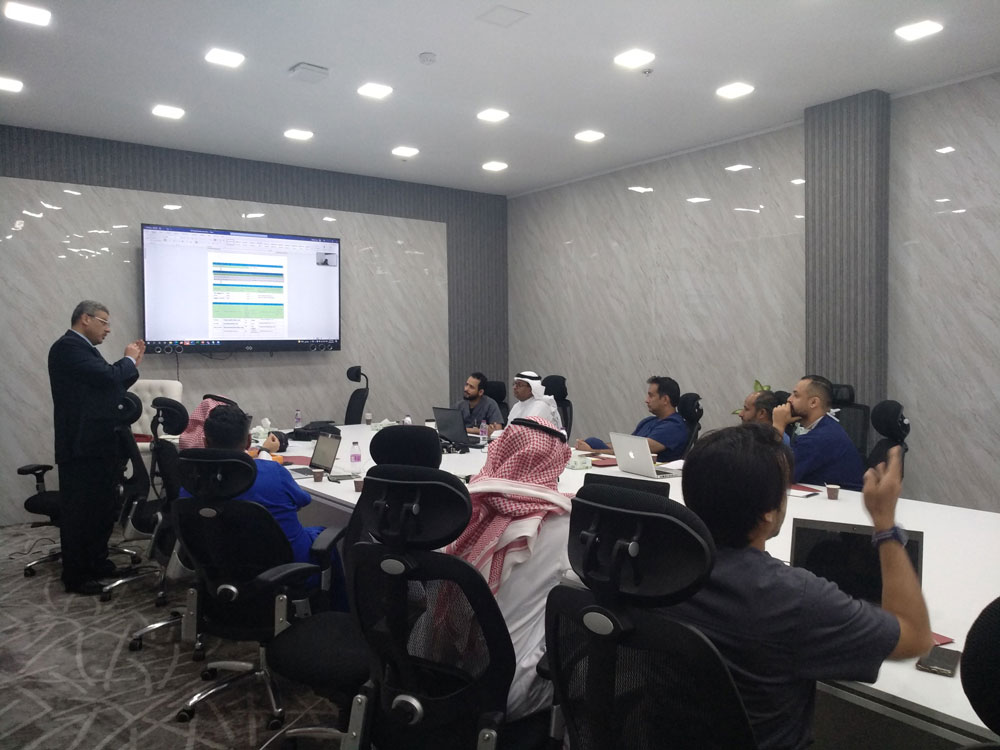 The pilot testing took place in the two cities of Jazan and Jeddah. Photo: WHO Cairo, 3 April 2022 – WHO’s upgraded influenza platform, EMFLU-2, is being pilot-tested in Saudi Arabia, offering additional functionality for data collection and analysis, including capturing and sharing multi-pathogen laboratory data.
Detecting and responding early to influenza outbreaks is essential to mitigate impact, and one way to achieve this is by ensuring the availability of good surveillance data. The new tool developed by WHO’s Regional Office for the Eastern Mediterranean aims to do this by allowing
...
The pilot testing took place in the two cities of Jazan and Jeddah. Photo: WHO Cairo, 3 April 2022 – WHO’s upgraded influenza platform, EMFLU-2, is being pilot-tested in Saudi Arabia, offering additional functionality for data collection and analysis, including capturing and sharing multi-pathogen laboratory data.
Detecting and responding early to influenza outbreaks is essential to mitigate impact, and one way to achieve this is by ensuring the availability of good surveillance data. The new tool developed by WHO’s Regional Office for the Eastern Mediterranean aims to do this by allowing
...
WHO builds capacity of rapid response team in Iraq with a focus on Crimean-Congo haemorrhagic fever

...
WHO recommends Saudi Arabia’s public health laboratory for recognition as national influenza centre

...
Oman launches WHO collaborating centre for emerging and re-emerging infectious diseases

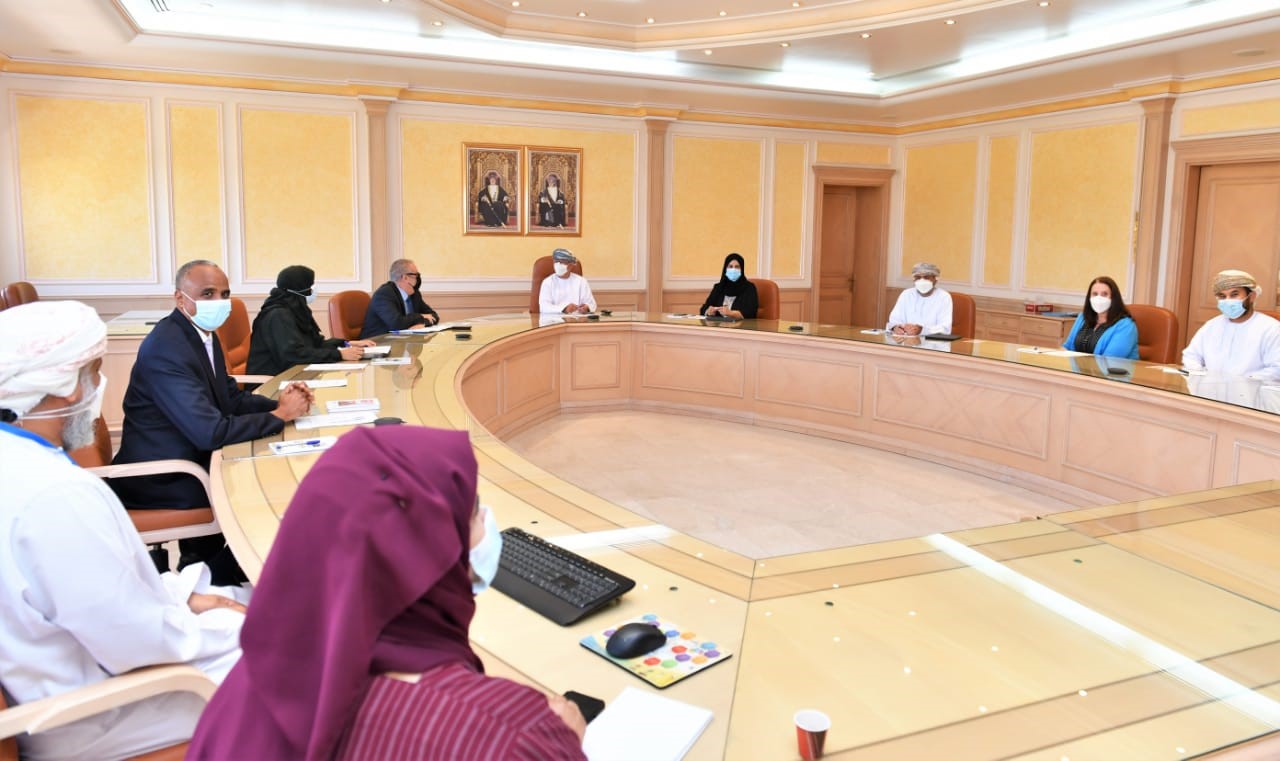 Oman’s Minister of Health presided over the launch of the WHO collaborating centre. Photo: WHO Cairo, 22 February 2022 – Oman’s central public health laboratories have been designated a WHO collaborating centre for emerging and re-emerging infectious diseases.
The official launch took place on 16 February 2022 and was presided over by Dr Ahmed Al-Saeedi, Oman’s Minister of Health, who ascribed the importance of this designation to the support and contribution it will make to WHO’s efforts in building regional and national laboratory diagnostic capacities.
“As the first designated WHO collaborating centre
...
Oman’s Minister of Health presided over the launch of the WHO collaborating centre. Photo: WHO Cairo, 22 February 2022 – Oman’s central public health laboratories have been designated a WHO collaborating centre for emerging and re-emerging infectious diseases.
The official launch took place on 16 February 2022 and was presided over by Dr Ahmed Al-Saeedi, Oman’s Minister of Health, who ascribed the importance of this designation to the support and contribution it will make to WHO’s efforts in building regional and national laboratory diagnostic capacities.
“As the first designated WHO collaborating centre
...
Jordan updates its risk communication and community engagement plan for pandemic influenza preparedness

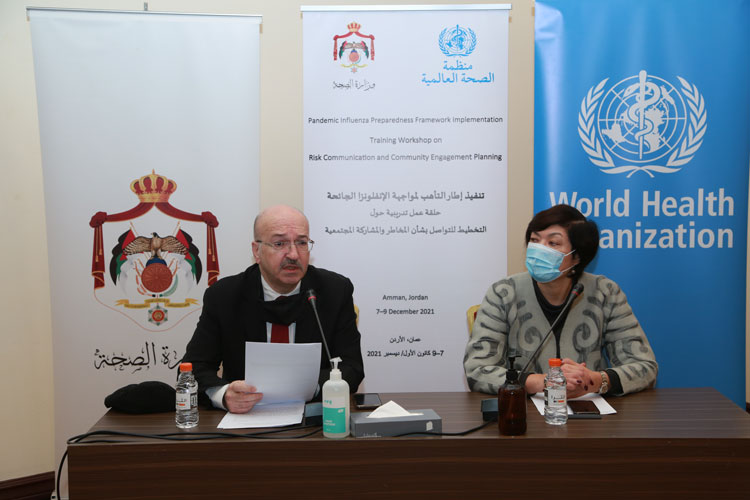 Opening session by Dr Ghazi Faisal Sharkas, Director of Primary Health Care at the Ministry of Health and Dr Chinara Aidyralieva, Coordinator of Public Heath at WHO country office. Photo: WHO Cairo, 14 December 2021 – Jordan is currently reviewing and updating its risk communication and community engagement (RCCE) plan for pandemic influenza preparedness based on best practices and lessons learned during the COVID-19 response.
A workshop to review the plan was held between 7 and 9 December 2021 by the Ministry of Health with technical support from the WHO country office
...
Opening session by Dr Ghazi Faisal Sharkas, Director of Primary Health Care at the Ministry of Health and Dr Chinara Aidyralieva, Coordinator of Public Heath at WHO country office. Photo: WHO Cairo, 14 December 2021 – Jordan is currently reviewing and updating its risk communication and community engagement (RCCE) plan for pandemic influenza preparedness based on best practices and lessons learned during the COVID-19 response.
A workshop to review the plan was held between 7 and 9 December 2021 by the Ministry of Health with technical support from the WHO country office
...
Learning from Saudi Arabia’s COVID-19 response amid its health sector transformation

 Testing COVID-19 through RT-PCR by the Public Health Laboratory is one of the significant and ongoing achievements taking place in Saudi Arabia. Photo: WHO Regional Office for the Eastern Mediterranean Cairo, 31 October 2021 – Strong governance and intersectoral coordination have led to evidence-based decision-making in Saudi Arabia, and there are significant and ongoing achievements taking place in laboratory diagnostics, health information management and response interventions against COVID-19.
These were some of the key findings identified by a technical mission that was conducted by the WHO Regional Office for the Eastern
...
Testing COVID-19 through RT-PCR by the Public Health Laboratory is one of the significant and ongoing achievements taking place in Saudi Arabia. Photo: WHO Regional Office for the Eastern Mediterranean Cairo, 31 October 2021 – Strong governance and intersectoral coordination have led to evidence-based decision-making in Saudi Arabia, and there are significant and ongoing achievements taking place in laboratory diagnostics, health information management and response interventions against COVID-19.
These were some of the key findings identified by a technical mission that was conducted by the WHO Regional Office for the Eastern
...
Strengthening Syria’s rapid response team and early warning system

 The WHO Regional Office for the Eastern Mediterranean conducted a technical mission to the Syrian Arab Republic with the aim of supporting the country’s preparedness and response capacity to high-threat pathogens. The mission, which took place from 31 July to 9 August, focused on strengthening early detection and rapid response, enhancing rapid response team (RRT) capacity and improving pandemic influenza preparedness (PIP) implementation and influenza surveillance. WHO has been supporting the Syrian health authorities to transition from the Early Warning, Alert and Response System (EWARS) to routine surveillance for sustainability purposes.
WHO
...
The WHO Regional Office for the Eastern Mediterranean conducted a technical mission to the Syrian Arab Republic with the aim of supporting the country’s preparedness and response capacity to high-threat pathogens. The mission, which took place from 31 July to 9 August, focused on strengthening early detection and rapid response, enhancing rapid response team (RRT) capacity and improving pandemic influenza preparedness (PIP) implementation and influenza surveillance. WHO has been supporting the Syrian health authorities to transition from the Early Warning, Alert and Response System (EWARS) to routine surveillance for sustainability purposes.
WHO
...
WHO and System Staff College open pandemic leadership programme materials to public

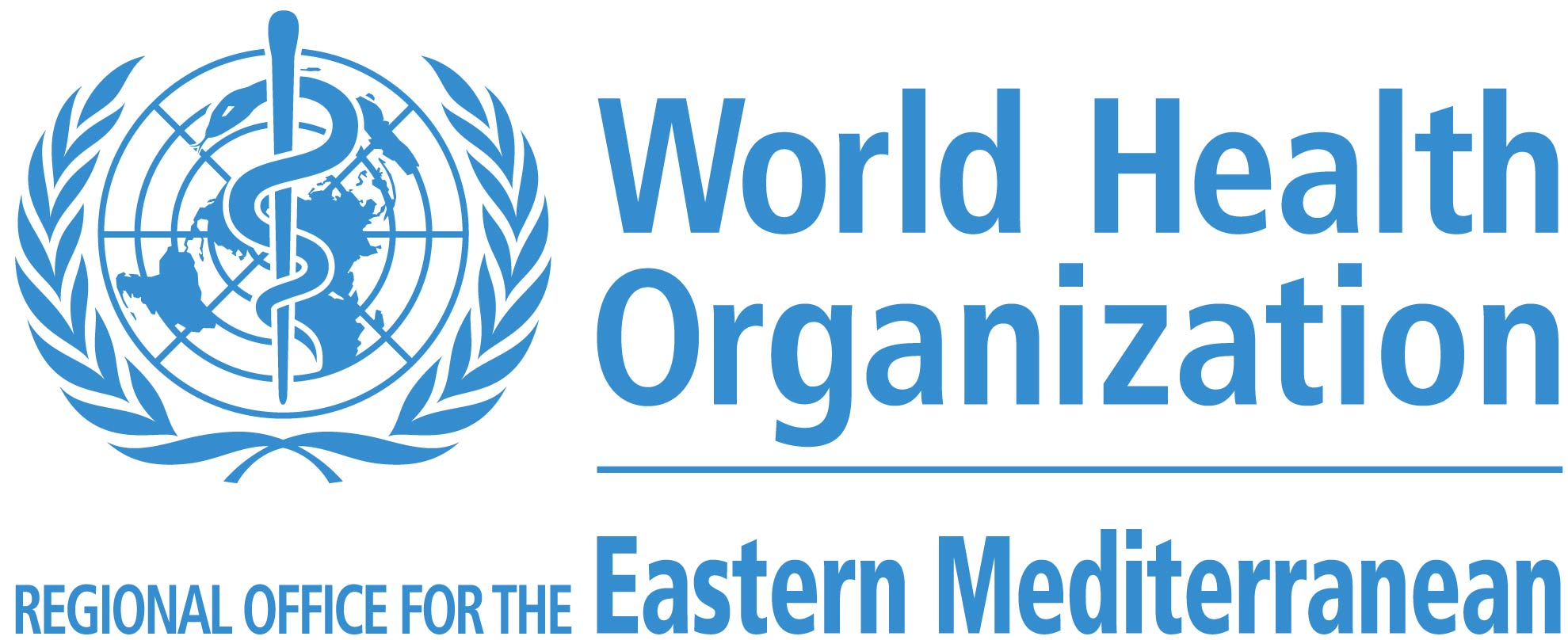
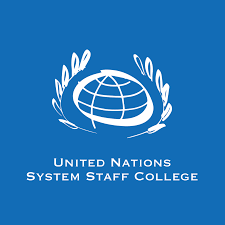 The WHO Regional Office for the Eastern Mediterranean, together with the United Nations System Staff College (UNSSC) have made publicly available new course materials on OpenWHO.org , as part of the Leadership Programme on Epidemic and Pandemic Preparedness and Response.
The online course features recordings of prominent public health experts delivering monthly leadership lectures, self-paced and interactive modules on related leadership topics, and learning resources, including articles, journals and multimedia material for further leadership development.
This comes as part of the first phase of a pilot programme designed and developed by the
...
The WHO Regional Office for the Eastern Mediterranean, together with the United Nations System Staff College (UNSSC) have made publicly available new course materials on OpenWHO.org , as part of the Leadership Programme on Epidemic and Pandemic Preparedness and Response.
The online course features recordings of prominent public health experts delivering monthly leadership lectures, self-paced and interactive modules on related leadership topics, and learning resources, including articles, journals and multimedia material for further leadership development.
This comes as part of the first phase of a pilot programme designed and developed by the
...
Pandemic preparedness and response in the Region in light of recent report and proposed International Framework Convention

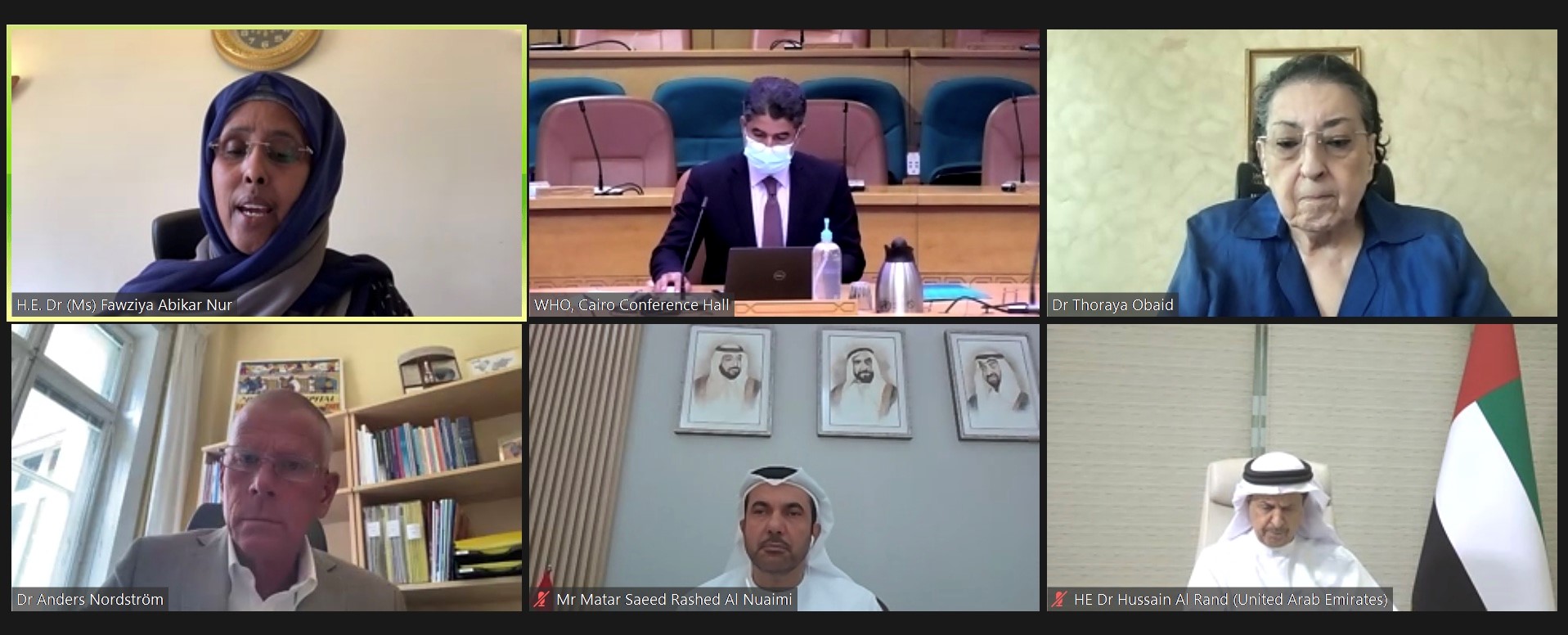 Cairo, 28 September 2021 – WHO convened a meeting attended by diverse regional and global public health leaders to discuss pandemic preparedness and response from the perspective of countries in the Eastern Mediterranean Region, particularly those affected by conflict. The meeting took place on 6 September 2021 and was organized in collaboration with the Lancet-SIGHT Commission on Peaceful Societies, the Independent Panel on Pandemic Preparedness and Response (IPPPR), and the Abu Dhabi Public Health Centre in the United Arab Emirates.
Fifteen health leaders representing Pakistan, Somalia, Sweden, Tunisia and United Arab Emirates,
...
Cairo, 28 September 2021 – WHO convened a meeting attended by diverse regional and global public health leaders to discuss pandemic preparedness and response from the perspective of countries in the Eastern Mediterranean Region, particularly those affected by conflict. The meeting took place on 6 September 2021 and was organized in collaboration with the Lancet-SIGHT Commission on Peaceful Societies, the Independent Panel on Pandemic Preparedness and Response (IPPPR), and the Abu Dhabi Public Health Centre in the United Arab Emirates.
Fifteen health leaders representing Pakistan, Somalia, Sweden, Tunisia and United Arab Emirates,
...
MERS and COVID-19 response: leveraging the “One Health” approach to combat public health threats

 Cairo, 22 September 2021 – Integrating work on Middle East respiratory syndrome (MERS) with the COVID-19 response took centre stage at a virtual meeting organized by the WHO Regional Office for the Eastern Mediterranean on 16 August 2021. Participants discussed how to view the pandemic as an opportunity to learn more about effective collaboration, information-sharing, case management and vaccine development to prepare and respond to emergencies under a “One Health” approach.
The MERS coronavirus (MERS-CoV) remains a high-threat respiratory pathogen because it causes severe disease that has a high case-fatality ratio of
...
Cairo, 22 September 2021 – Integrating work on Middle East respiratory syndrome (MERS) with the COVID-19 response took centre stage at a virtual meeting organized by the WHO Regional Office for the Eastern Mediterranean on 16 August 2021. Participants discussed how to view the pandemic as an opportunity to learn more about effective collaboration, information-sharing, case management and vaccine development to prepare and respond to emergencies under a “One Health” approach.
The MERS coronavirus (MERS-CoV) remains a high-threat respiratory pathogen because it causes severe disease that has a high case-fatality ratio of
...
Directors of national influenza centres in the Eastern Mediterranean Region meet to discuss challenges, opportunities, and the way forward for influenza laboratories

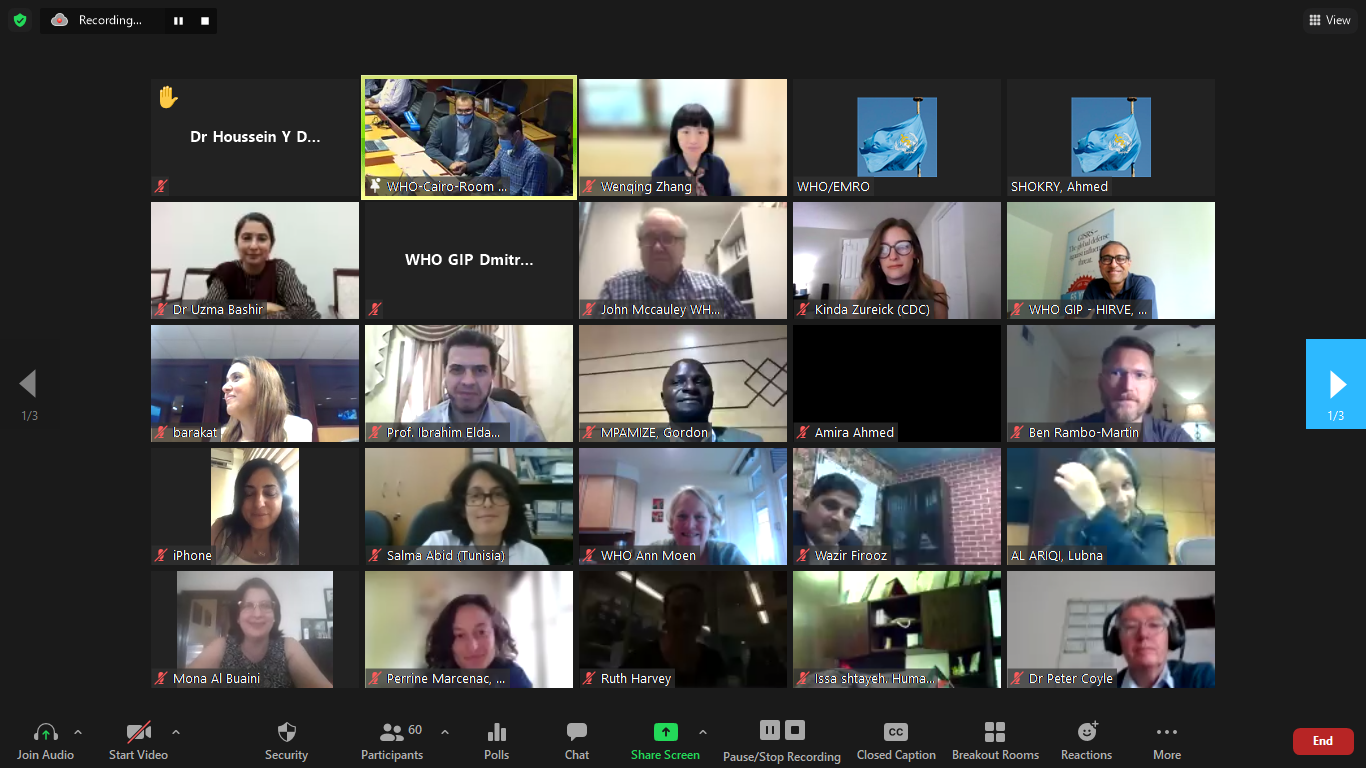 Cairo, 2 August 2021 – WHO convened a meeting for the directors of national influenza centres (NICs) in the Eastern Mediterranean Region to share new laboratory techniques and methodologies for influenza virus detection and characterization and discuss challenges they face in these areas of work. The meeting took place on 15 July 2021 and was organized by the Infectious Hazard Prevention and Preparedness unit of the WHO Health Emergencies Programme at the WHO Regional Office for the Eastern Mediterranean.
Directors of laboratories in the 22 countries of the Region were invited, along
...
Cairo, 2 August 2021 – WHO convened a meeting for the directors of national influenza centres (NICs) in the Eastern Mediterranean Region to share new laboratory techniques and methodologies for influenza virus detection and characterization and discuss challenges they face in these areas of work. The meeting took place on 15 July 2021 and was organized by the Infectious Hazard Prevention and Preparedness unit of the WHO Health Emergencies Programme at the WHO Regional Office for the Eastern Mediterranean.
Directors of laboratories in the 22 countries of the Region were invited, along
...
Identifying challenges and solutions for pandemic influenza preparedness in the Region

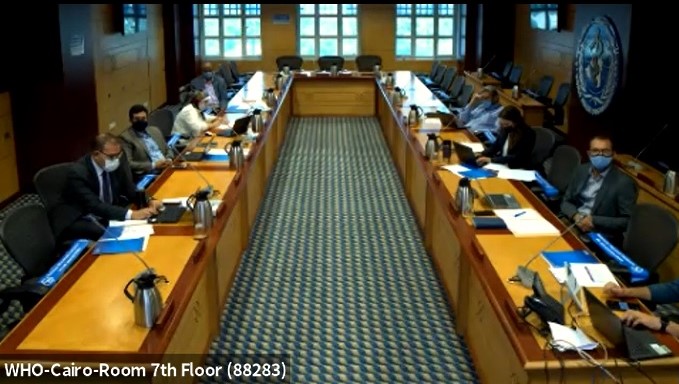 Cairo, 2 August 2021 – Working on pandemic influenza preparedness (PIP) during the COVID-19 pandemic has proven to be challenging for priority countries in the Eastern Mediterranean Region, but WHO has been supporting these countries to address challenges in ensuring effective implementation of the PIP framework.
This was the outcome of a country focal points meeting held virtually on 7 July 2021. The annual PIP coordination meeting was organized by the Infectious Hazard Prevention and Preparedness (IHP) unit of the WHO Health Emergencies Programme at the WHO Regional Office for the Eastern
...
Cairo, 2 August 2021 – Working on pandemic influenza preparedness (PIP) during the COVID-19 pandemic has proven to be challenging for priority countries in the Eastern Mediterranean Region, but WHO has been supporting these countries to address challenges in ensuring effective implementation of the PIP framework.
This was the outcome of a country focal points meeting held virtually on 7 July 2021. The annual PIP coordination meeting was organized by the Infectious Hazard Prevention and Preparedness (IHP) unit of the WHO Health Emergencies Programme at the WHO Regional Office for the Eastern
...
WHO helps assess and strengthen laboratory diagnostic capacity for high-threat pathogens in Libya

...
WHO trains critical care/ICU nurses in the Gaza Strip in response to COVID-19

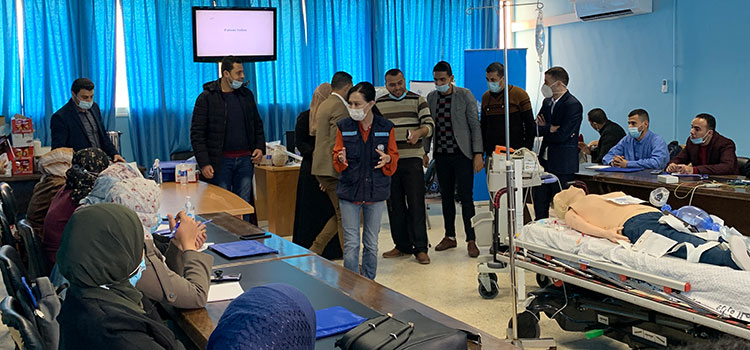 6 April 2021 – WHO continues to support occupied Palestinian territory during the COVID-19 pandemic with the treatment of patients suffering from severe COVID-19 taking centre stage during a training workshop delivered to nurses working in, or who will be assigned to, COVID-19 intensive care units (ICUs).
Basic ICU training was delivered to doctors in December 2020, and the Ministry of Health of the Gaza Strip subsequently made an urgent request to train non-ICU nurses in response to an exponential increase in the number of cases of severe COVID-19 patients.
6 April 2021 – WHO continues to support occupied Palestinian territory during the COVID-19 pandemic with the treatment of patients suffering from severe COVID-19 taking centre stage during a training workshop delivered to nurses working in, or who will be assigned to, COVID-19 intensive care units (ICUs).
Basic ICU training was delivered to doctors in December 2020, and the Ministry of Health of the Gaza Strip subsequently made an urgent request to train non-ICU nurses in response to an exponential increase in the number of cases of severe COVID-19 patients.
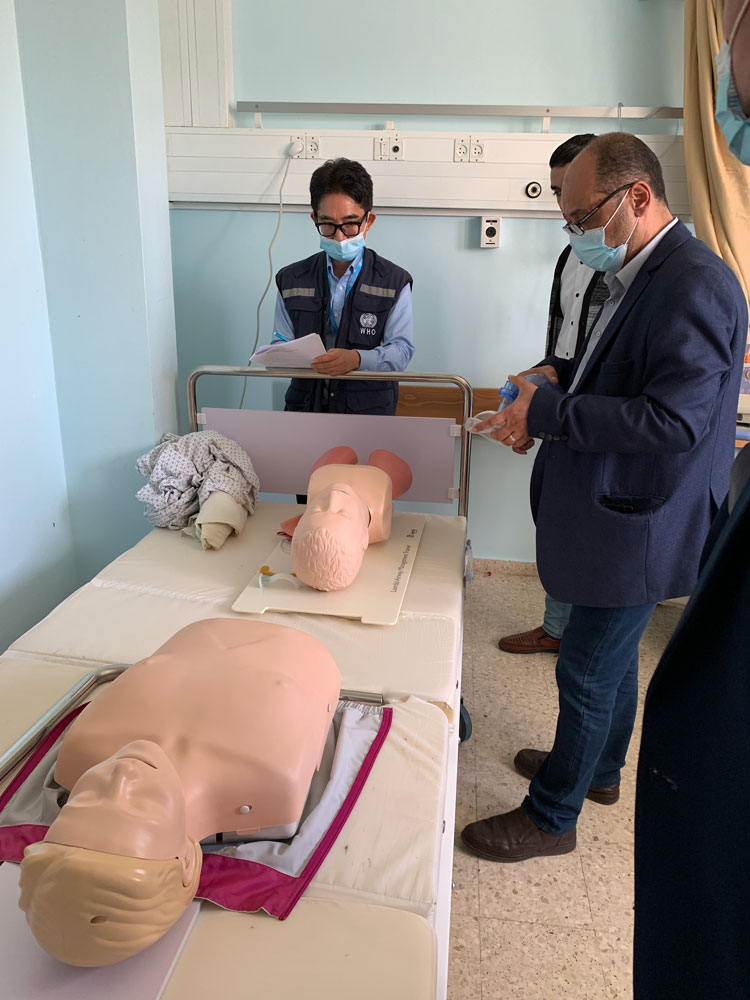 Ten senior
...
Ten senior
...
Building Somalia’s capacities in critical and intensive care

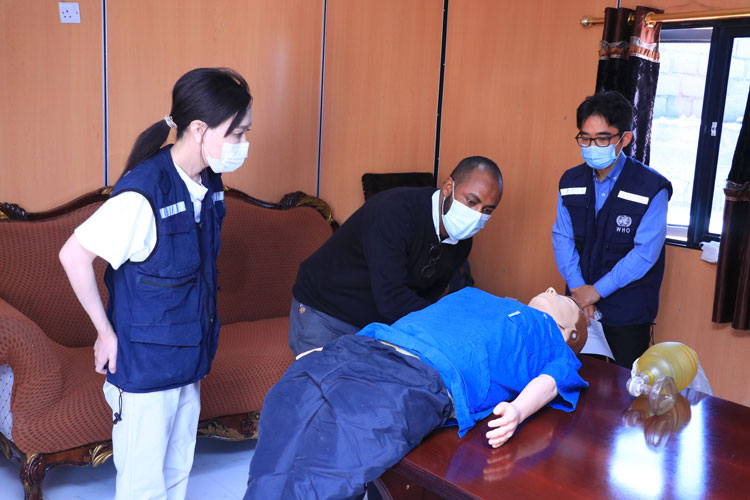 8 March 2021 - WHO delivered an introductory intensive care unit (ICU) training workshop to 14 participants selected from different regions of Somalia as an introduction to the fundamentals of critical care management to help build technical and clinical competencies in the management of critically ill patients and develop skills in operating life support equipment, while making the best use of existing resources.
The 5-day pilot training that took place between 14 and 18 February 2021 in Hargeisa, Somaliland, was designed to cover critical care practice and skills adapted to the needs
...
8 March 2021 - WHO delivered an introductory intensive care unit (ICU) training workshop to 14 participants selected from different regions of Somalia as an introduction to the fundamentals of critical care management to help build technical and clinical competencies in the management of critically ill patients and develop skills in operating life support equipment, while making the best use of existing resources.
The 5-day pilot training that took place between 14 and 18 February 2021 in Hargeisa, Somaliland, was designed to cover critical care practice and skills adapted to the needs
...
WHO supports Syria to fight COVID-19 and reactivate influenza sentinel surveillance

 8 February 2021 - In 2020, the WHO Regional Office for the Eastern Mediterranean conducted a 3-month mission to Syria to provide technical support to the WHO country office and the Ministry of Health for their response to the COVID-19 pandemic, and to follow up on the implementation of recommendations from previous missions and support the Ministry to re-activate influenza-like illness (ILI) and severe acute respiratory infection (SARI) sentinel sites, and establish new SARI sentinel sites.
The mission, which took place from 7 August to 14 October 2020, also provided support to
...
8 February 2021 - In 2020, the WHO Regional Office for the Eastern Mediterranean conducted a 3-month mission to Syria to provide technical support to the WHO country office and the Ministry of Health for their response to the COVID-19 pandemic, and to follow up on the implementation of recommendations from previous missions and support the Ministry to re-activate influenza-like illness (ILI) and severe acute respiratory infection (SARI) sentinel sites, and establish new SARI sentinel sites.
The mission, which took place from 7 August to 14 October 2020, also provided support to
...
WHO supports countries transition from EWARN to routine surveillance

WHO is supporting ministries of health in countries experiencing acute or protracted humanitarian crises to transition from the Early Warning Alert and Response Network (EWARN) disease surveillance system, designed for emergencies, back to their routine surveillance systems without losing years of investment. EWARN is an adjunct to national disease surveillance systems and should only be transitioned or reintegrated into the national surveillance systems when feasible and once the acute emergency phase is over. Transition should be considered for countries or areas which are stable with improved security or a recovered health system. The ...
بعثات منظمة الصحة العالمية تدعم اليمن في مكافحة كوفيد-19

 نظّمت منظمة الصحة العالمية مؤخراً بعثات تقنية إلى اليمن لدعم تدابير الاستجابة لكوفيد-19 التي اتخذتها البلاد من خلال تحسين رعاية الحالات المرضية الخطيرة وتعزيز الترصد والاختبارات لاكتشاف الحالات الجديدة.
وعملت البعثات، التي جرت في الفترة من حزيران/يونيو إلى آب/أغسطس 2020 في جنوب اليمن، مع فرقة العمل المعنية بالتدبير العلاجي السريري والتي بدأت في أواخر تموز/يوليو 2020 بعد تحديد كبار الاستشاريين الوطنيين. وناقش فريق العمل ونفذ وقييم ورصد وتابع الخطط التشغيلية للتدبير العلاجي السريري. واستعرضت البعثات أيضاً الممارسات الحالية للترصُّد ومختبرات كوفيد-19، التي تنفذها السلطة الصحية المحلية والشركاء في جنوب اليمن. وعلاوة على
...
نظّمت منظمة الصحة العالمية مؤخراً بعثات تقنية إلى اليمن لدعم تدابير الاستجابة لكوفيد-19 التي اتخذتها البلاد من خلال تحسين رعاية الحالات المرضية الخطيرة وتعزيز الترصد والاختبارات لاكتشاف الحالات الجديدة.
وعملت البعثات، التي جرت في الفترة من حزيران/يونيو إلى آب/أغسطس 2020 في جنوب اليمن، مع فرقة العمل المعنية بالتدبير العلاجي السريري والتي بدأت في أواخر تموز/يوليو 2020 بعد تحديد كبار الاستشاريين الوطنيين. وناقش فريق العمل ونفذ وقييم ورصد وتابع الخطط التشغيلية للتدبير العلاجي السريري. واستعرضت البعثات أيضاً الممارسات الحالية للترصُّد ومختبرات كوفيد-19، التي تنفذها السلطة الصحية المحلية والشركاء في جنوب اليمن. وعلاوة على
...
Webinar on Pandemic Preparedness and Framework Convention in the Eastern Mediterranean Region
You are invited to a live webinar on
Pandemic Preparedness in Eastern Mediterranean Region
with a focus on the
International Framework Convention on Pandemic Preparedness and Response
6 September 2021
11:00 am Cairo time
Register» More information
Evaluating Yemen’s disease surveillance and early warning system

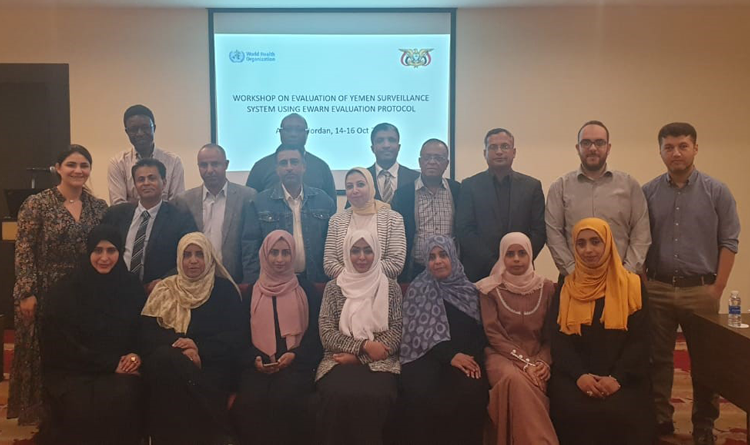 Participants from the Ministry of Public Health in Yemen participated in the workshop. (Photo: WHO)
The World Health Organization (WHO) in collaboration with the Ministry of Public Health (MoPH) in Yemen organized a workshop to prepare and develop an action plan for the evaluation of the country’s surveillance system which is based on the Early Warning Alert and Response Network (EWARN).
The workshop, which took place on 14-16 October 2019, aimed to train participants on how the EWARN system functions; assess its effectiveness and usefulness to detect, confirm and respond to priority
...
Participants from the Ministry of Public Health in Yemen participated in the workshop. (Photo: WHO)
The World Health Organization (WHO) in collaboration with the Ministry of Public Health (MoPH) in Yemen organized a workshop to prepare and develop an action plan for the evaluation of the country’s surveillance system which is based on the Early Warning Alert and Response Network (EWARN).
The workshop, which took place on 14-16 October 2019, aimed to train participants on how the EWARN system functions; assess its effectiveness and usefulness to detect, confirm and respond to priority
...
Early Warning Alert and Response Network launched in Djibouti to detect epidemic-prone diseases

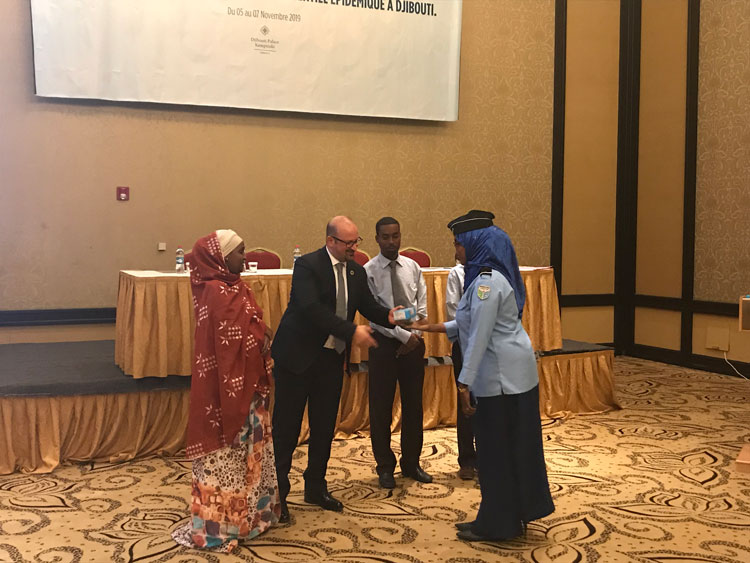 The Early Warning Alert and Response Network (EWARN) has been launched in Djibouti to strengthen the country’s surveillance system for priority and epidemic-prone diseases. The system will allow health authorities to receive high quality epidemiological data that is accurate, complete and available on a real-time basis.
The launch took place as part of a three-day workshop that was held in Djibouti city from 5 to 7 November 2019 during which participants came to learn about the concept of early detection and response to epidemic-prone diseases. Their capacities and skills were strengthened for
...
The Early Warning Alert and Response Network (EWARN) has been launched in Djibouti to strengthen the country’s surveillance system for priority and epidemic-prone diseases. The system will allow health authorities to receive high quality epidemiological data that is accurate, complete and available on a real-time basis.
The launch took place as part of a three-day workshop that was held in Djibouti city from 5 to 7 November 2019 during which participants came to learn about the concept of early detection and response to epidemic-prone diseases. Their capacities and skills were strengthened for
...
منظمة الصحة العالمية وشركاؤها يحشدون أدوية فيروس نقص المناعة البشري للأطفال المصابين في باكستان

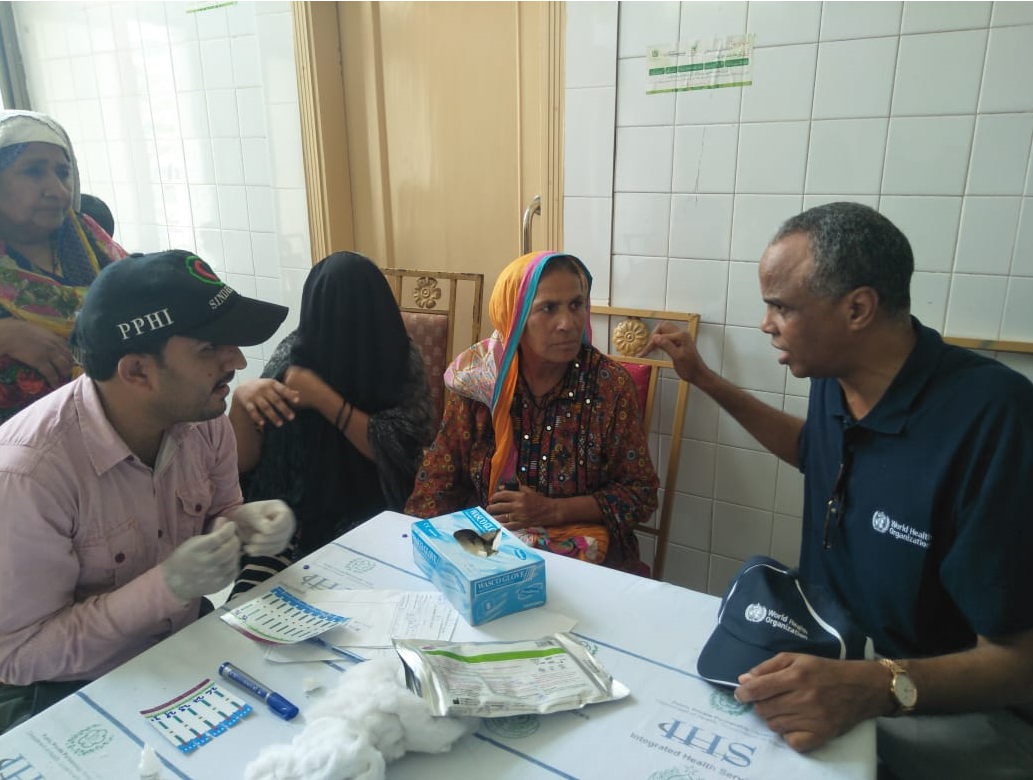 خبراء منظمة الصحة العالمية يستعرضون سجلات المرافق الطبية في باكستان (الصورة: لمنظمة الصحة العالمية)
خبراء منظمة الصحة العالمية يستعرضون سجلات المرافق الطبية في باكستان (الصورة: لمنظمة الصحة العالمية)
27 آب/أغسطس 2019 - على الأرجح أن فاشية فيروس نقص المناعة البشري في باكستان، التي أصابت 903 أشخاص في مقاطعة لاركانا بمقاطعة السند حتى 4 تموز/يوليو، قد نجمت عن الحَقْن غير الآمن وسوء ممارسات مكافحة العدوى في المرافق الصحية. وطلبت وزارة الصحة الاتحادية في باكستان الدعم لتقصِّي الحالات وتحديد مدى انتشار المرض وأسبابه، واقتراح تدابير الاستجابة الفورية، والتوصية بالاحتياجات البرنامجية. وقد أوفدت المنظمة فريقًا دوليًا لتقصِّي فاشية فيروس نقص المناعة البشري ومكافحته في لاركانا، في الفترة من
...
Jordan: First country in the Region to start implementing WHO's Emergency Risk Communication Package

...
WHO builds Rapid Response Team capacity in Eastern Mediterranean Region with Japan’s support

 H.E. Mr Masaki Noke (center) addresses the workshop participants with WHO experts Dr Peter Mala (l) and Dr Maria van Kerkhove (r) (Photo: Simon van Woerden/WHO)
This week over 50 experts in surveillance, field epidemiology, infection control, laboratory and more are convening in Cairo for a Rapid Response Team (RRT) training. Rapid Response Teams (RRTs) are a crucial part of the response to MERS and other respiratory disease outbreaks in WH’s Eastern Mediterranean, and as such WHO’s Regional Office for the Mediterranean has organized this training with the generous support of
...
H.E. Mr Masaki Noke (center) addresses the workshop participants with WHO experts Dr Peter Mala (l) and Dr Maria van Kerkhove (r) (Photo: Simon van Woerden/WHO)
This week over 50 experts in surveillance, field epidemiology, infection control, laboratory and more are convening in Cairo for a Rapid Response Team (RRT) training. Rapid Response Teams (RRTs) are a crucial part of the response to MERS and other respiratory disease outbreaks in WH’s Eastern Mediterranean, and as such WHO’s Regional Office for the Mediterranean has organized this training with the generous support of
...
الحصبة في تونس: معالجة الثغرات مع وجود تمنيع وطني قوي

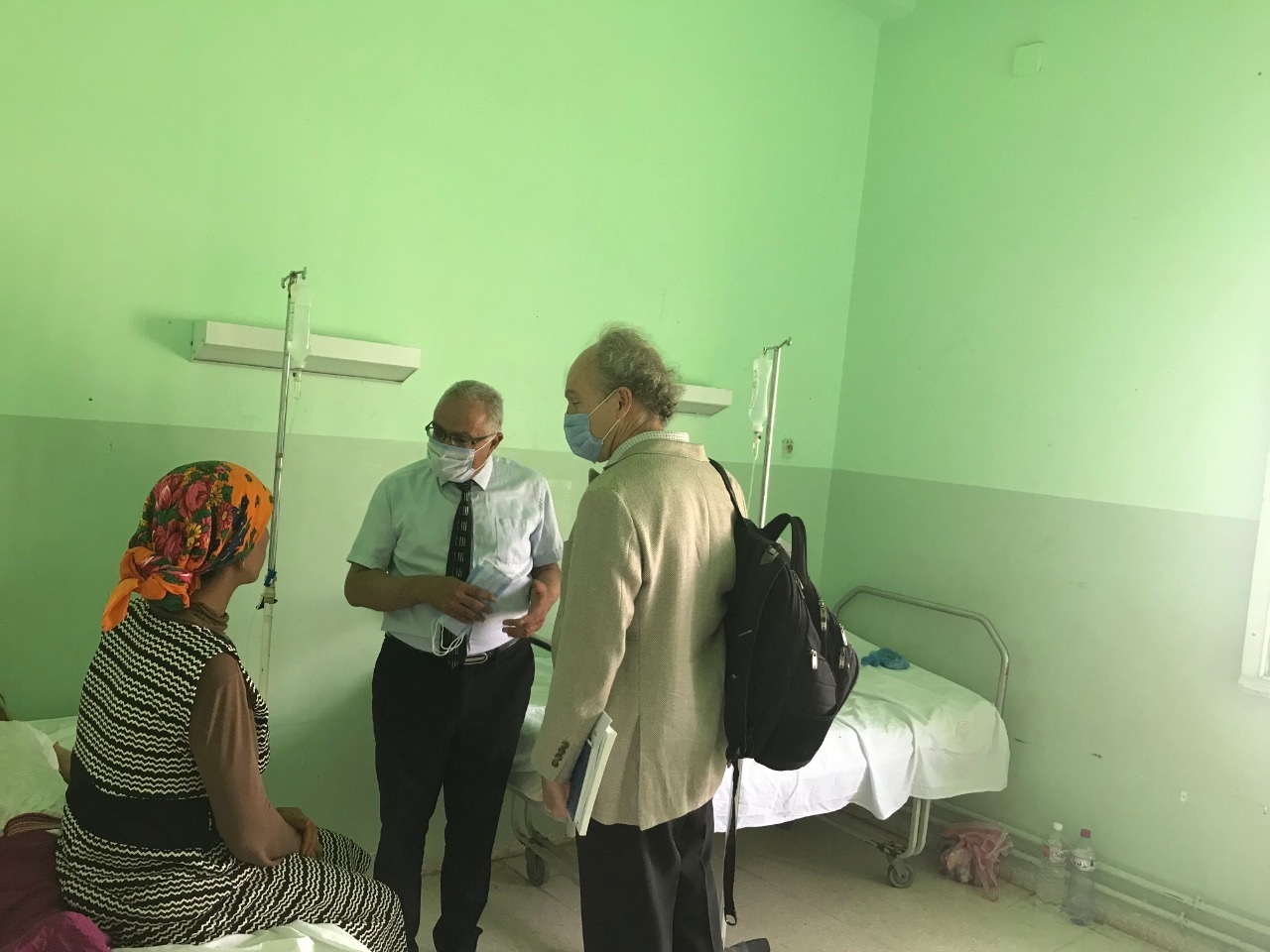 خبراء من منظمة الصحة العالمية ووزارة الصحة التونسية يتحدثون مع أم طفل مصاب بالحصبة(صورة من الدكتورة شيرين النُصيري، منظمة الصحة العالمية)
خبراء من منظمة الصحة العالمية ووزارة الصحة التونسية يتحدثون مع أم طفل مصاب بالحصبة(صورة من الدكتورة شيرين النُصيري، منظمة الصحة العالمية)








